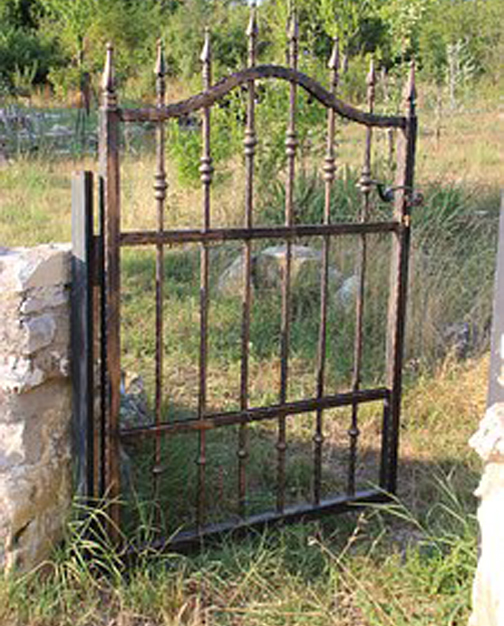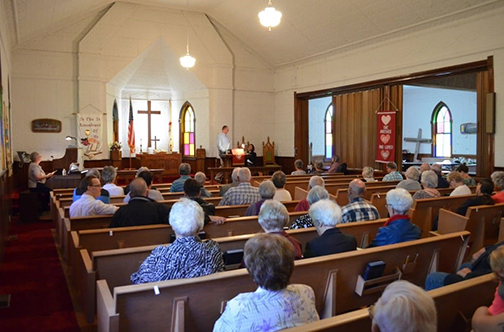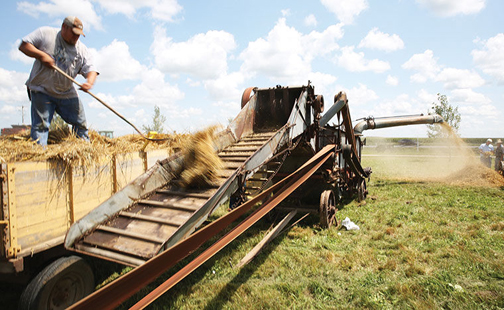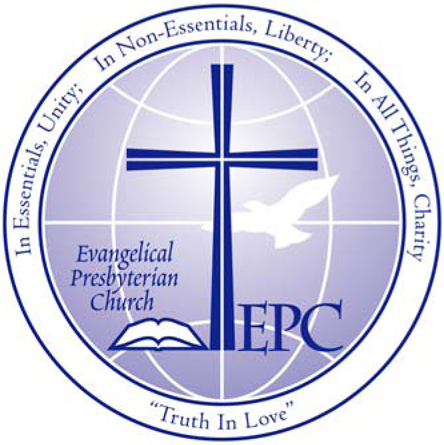 |
Devotionals for Women |  |
_______________
![[Graphic of three kings meeting Herod]](https://www.rpcerie.org/images/three_kings_consult_Herod.jpg)
Who is the Fairest?
| He must increase, but I must decrease. |
| —John 3:30 |
We all can likely recall the wicked queen in the tale of Snow White and the Seven Dwarfs, when she stands before a magic mirror and asks the question, “Mirror, mirror, on the wall, who’s the fairest of them all?” hoping for the answer, “You, O Queen, are fairer than Snow White.”
This kind of jealousy has plagued the human race far before this Snow White story—published by Jacob Ludwig Karl Grimm and his brother, Wilhelm Carl Grimm—ever appeared in print. In fact, the first murder in the Bible concerns two brothers vying over which of their sacrifices should receive the most favor from God (please see Genesis 4).
We find this temptation to murder, even if only hidden in the hearts of men and women, throughout history. When Saul served as king of Israel and heard the crowds shouting that “Saul has killed his thousands and David his ten thousands,” Saul set in motion the murderous plots to rid the world of this rival (please see 1 Samuel 18).
In the Christmas story, the Magi had followed the star they had seen in the sky. They had come to Jerusalem seeking the new King of Israel. Thinking that the present king might know the whereabouts of this future ruler, they stopped in the city to visit Herod and ask for a specific route.
I like the way that Angela Hunt, in her The Nativity Story, portrays the encounter between the Magi and the evil King Herod. Of course, we can’t know exactly the conversation and further discussions of the men from the East. But, Hunt’s description gives us a mental picture of the encounters. This comes from the story after their visit to the Christ Child. 1
Melchior stroked his beard and considered Herod’s marble city. Perhaps God was warning him through the stars, or perhaps this conjunction [of stars] meant nothing. But an uneasiness moved at the core of his being, and he hadn’t liked the look of cunning he’d glimpsed in Herod’s eye.
Last night he’d seen that same look in a dream he had while dozing next to some talkative shepherd… “The one they call Herod the Great has murdered two sons and a wife,” Melchior said, picking up his reins. “I do not think he’d hesitate to kill an innocent child of Bethlehem, do you?”
Neither Gaspar nor Balthazar answered, but neither did they protest when Melchior turned his camel away from Herod’s city. They would take the road from Bethlehem to Jericho, heading east without returning to Jerusalem.
As it turned out, murderous Herod, after learning the biblical prophecy of a child, probably under two years old, had all the babies that age murdered in Bethlehem. Fortunately, as directed by God, Joseph, Mary, and the young child Jesus, had escaped to Egypt.
This sin of murderous jealousy, this wanting to be rid of our enemies, comes at us in so many tempting ways, even some that sound practically reasonable to us in our minds. Why not try to get rid of that school principal who constantly gives us a hard time? Why not get rid of my boss, in order to explain why I should get that achievement award above others? Why not exaggerate the troubles I’ve had from this or that person, so that I can look better in the eyes of my friends?
The Bible also has plenty of men and women who, because of their supernatural life of grace through Christ, have taken the route of humility, obedience, and submission to unfair suffering. John the Baptist, whom Jesus called the greatest man to ever live, came introducing our Lord. John the Baptist lived humbly and prepared the people for the Greater One, Jesus. John the Baptist spoke the words, “He must increase, but I must decrease.”
During this Christmas season, let us contrast these two men and their reaction to the King of Kings and Lord of Lords: Herod on one hand—jealous, unhappy, murderous—and John the Baptist on the other hand—humble, obedient and submissive. How would our Lord have us live in our time, so that others see Him above our selfishness?
______________________
| 1 Hunt, Angela. The Nativity Story. Carol Stream, IL: Tyndale House Publishers, 2006. Pp.177-178. |
—Posted: Monday, December 26, 2022
_______________
![[Photo of a sunset in the winter woods]](https://www.rpcerie.org/images/sunset_in_the_winter_woods.jpg)
A Beautiful Silence
| “The Lord is in his holy temple; let all the earth be silent before him.” |
| —Habakkuk 2:20 |
Silence adorns the Season of Advent. While the world around us goes crazy with shopping and parties, God calls us to wait in quiet for Him.
In the northern climes, nature hides the earth in a blanket of white stillness. No birds call to us from the wooded glens. Even the sleeping animals and foliage wait in quiet. We, who recall the Nativity, wait in silence for the coming celebration of our newborn Savior.
To prepare for this coming—to prepare for the Holy Spirit’s coming at any time—or for the hearing of God’s written Word, we should prepare in silence and wait to recognize the coming of God’s awesome presence. We must practice silence and wait for Him.
Can you imagine the period of silence before God first spoke, when He said, “Let there be light!”? Or, the 400-year period of silence between the last prophecy of the Old Testament from Malachi until the angel spoke to Mary? In Heaven, at the opening of the seventh seal, a half hour of silence preceded the blowing of trumpets and the message of the seven angels. (Revelation 8:1-2)
We need to pause and refresh our poor brains in silence, separating ourselves from the cacophony of our materialistic world by spending time before our God and in His written Word. Many people can find this kind of re-set, walking in the penetrating stillness of nature. Others experience a re-set through the ministry of quiet music. Still others gain a re-set by contemplating great works of art. When we have prepared ourselves for its work in silence, God’s written Word speaks so much more powerfully.
This silent waiting for Christ, this Advent stillness, often results in giving us the most blessedness of the Season. We know from Genesis 3:8-9 that God waited for Adam and Eve in the quietness and beauty of the Garden. Even today, He waits for companionship with us, as well. The Babe of Bethlehem came for this very reason—to restore fellowship between heaven and earth.
This Season of Advent, let’s purposefully appreciate the anticipation and excitement that flows to us because we wait for the Promised One to come with His gifts of joy, hope, light, power, and His divine presence. During this Advent Season, Christ longs to bless us.
—Posted: Monday, December 19, 2022
_______________
![[Photo of the sun bursting through the clouds]](https://www.rpcerie.org/images/glory_in_the_sky.jpg)
Suddenly Christmas
| That night there were shepherds staying in the fields nearby, guarding their flocks of sheep. Suddenly, an angel of the Lord appeared among them, and the radiance of the Lord’s glory surrounded them. They were terrified, but the angel reassured them. “Don’t be afraid!” he said. “I bring you good news that will bring great joy to all people. The Savior—yes, the Messiah, the Lord—has been born today in Bethlehem, the city of David! And you will recognize him by this sign: You will find a baby wrapped snugly in strips of cloth, lying in a manger.” Suddenly, the angel was joined by a vast host of others—the armies of heaven— praising God and saying, “Glory to God in highest heaven, and peace on earth to those with whom God is pleased.” |
| —Luke 2:8-14 NLT |
The familiar story of the shepherds on the night of our Savior’s birth never gets old. This band of societal outcasts, watching their smelly sheep on a hillside, reminds us that God came to earth for all people, no matter how rich or poor, no matter their social stratum, no matter … well, anything. The suddenness of the angel’s announcement and the suddenness of the vast host of angels must have totally blinded and stunned these humble men.
The people of that time may have known the prophecy recorded in Malachi 3:1:
“See, I will send my messenger, who will prepare the way before me. Then suddenly the Lord you are seeking will come to his temple; the messenger of the covenant, whom you desire, will come,” says the Lord Almighty.
Even so, they certainly didn’t expect Him to come in this manner and to these men. They had waited some 400 years since this prophecy was given to the people of Israel.
Recorded in Matthew 24 and 25, Jesus left a guide for his disciples pertaining to His second coming, telling them the manner of that coming, but admonishing them to stay vigilant. In Matthew 24:42, 44 Jesus told them:
“Therefore keep watch, because you do not know on what day your Lord will come…So you must be ready, because the son of Man will come at an hour when you do not expect him.”
Jesus instructs His followers in Matthew 25 by telling them the parable of “The Wise and Foolish Virgins,” that He, the Bridegroom will come. And, He will come to those alone who stand prepared for Him.
How do we prepare for such a coming? We allow the Holy Spirit to do His work of filling our lives with His light, His love, and by watching expectantly for Him.
In this context, I love the hymn, “Lo! He Comes, with Clouds Descending.” To us who wait for Him—if we remain alive on this earth at the time of His coming—we will see the glory of the Lord, and hear the heavenly choirs praising and singing, hallelujahs to our Everlasting God.
As you take in the music of this glorious hymn, allow the text on the screen to fill you with wonderful anticipation of the next advent of our King of Kings!
—Posted: Monday, December 12, 2022
_______________
![[Graphic of shepherds and angels]](https://www.rpcerie.org/images/shepherds_and_angels.jpg)
Revealed
| And the glory of the Lord will be revealed, and all mankind together will see it. |
| —Isaiah 40:5 |
The verb “reveal” comes from the Latin word revelar meaning “to unveil.” It also means “to uncover” or “to make something that has been hidden known,” and also “to make a display of something.”
Certainly, God revealed Himself in a more understandable manner through the coming of the Babe in Bethlehem. Indicative of the blackness of the spiritual world, because of the silence of God’s prophets for 400 years, the nativity of the Lord Jesus Christ came in the dark of night.
According to Luke 2, the shepherds—a rag-tag bunch of smelly animal herders—were the first to hear the announcement of the birth. On a dark hillside, it was revealed to them that a Savior had been born who would save them and save all mankind.
To accompany this revelation, the glory of the Lord came and shone from the heavens, accompanied by an enormous host of angels. God was revealing Himself to the world in a way that He had never done before.
We read in Daniel 2:28 that:
…there is a God in heaven who reveals mysteries.
Throughout Jesus’ earthly ministry, God revealed Himself to His people. In a prayer to His Father during Jesus’ final hours before He gave His life to pay the penalty for the sins of the world, Jesus told God that He had brought Him glory by completing His work and by revealing God to those to whom He was given.
The revelation of God’s means of salvation had come to Jesus’ followers through His preaching and teaching ministry, and through the use of the Old Testament Scriptures, many of which He openly displayed as never before.
It certainly stands to reason that the last Book of the Bible—the Book of Revelation—is named for the opening of our eyes to the future. To most of us, the mysteries of God’s plan do not stand out clearly, but are revealed as if behind a veil.
Yet, we have enough light to know that this same Jesus still has more to reveal to His people. We know from God’s written Word that Jesus will come back for His people, and will reveal Himself fully to us in a New Heaven and a New Earth.
During this Season of Advent, let us open our hearts, our minds, and our eyes to see all that our Lord wishes to reveal to us now. May we spend time in His presence, looking at the promises of His written Word and seeking Him.
Let us also pray that He would use us to help reveal His glory to the dark world around us. We can pray this verse from an Advent hymn: 1
Redeemer, come!
I open wide my heart to Thee:
here, Lord, abide!
Let me Thy inner presence feel:
Thy grace and love in us reveal.
______________________
| 1 Weissel, Georg. “Lift Up Your Heads, Ye Mighty Gates.” Hymn in the Public Domain. |
—Posted: Monday, December 5, 2022
_______________

Prepare
| “A voice of one calling: ‘In the desert prepare the way for the Lord;’” |
| —Isaiah 40:3 |
Christmas preparations seem to begin earlier every year. If you’re like me, you would rather have a more leisurely time to get ready than become swept up in a last minute rush. After all, the point of the trappings, gifts, decorations, baking, and carol singing is to create an enjoyable anticipation, right?
We prepare for Christmas by shopping and gift buying, putting up the tree, baking all those special cookies and treats that our families love, and gathering with friends to sing carols. The day itself, for which we have so carefully prepared, comes and goes before we know it. But, the warm glow of the anticipation of it seems to last much longer.
If we think in spiritual terms, the holiday that celebrates the birth of our Savior, the Lord Jesus Christ, also requires a careful preparation. We consider the Season of Advent as that time of anticipation and readiness for both the celebration of Christ’s incarnation and also for His ultimate return. We sing hymns that reflect a poverty of spirit and humble consideration of how desperate we are without the new life that Christ came to give us.
One image that often gives me pause is that of the desert. We prepare for the Lord while we wander “in the desert.” We can think of this in terms of our dry, lifeless hearts coming in expectation to God. We can also reflect on the “desert places” of our circumstances. Perhaps the year has brought distress and sadness through grief, or sickness, or loss. God asks us to make this “desert” a prepared place into which Christ may come to us.
John the Baptist was sent to prepare the people for Jesus’ first coming. John lived in the desert and preached repentance of sins to those who so long had anticipated the coming of the Messiah. The Scriptures tell us in Luke 3:2-3:
… the word of God came to John, son of Zechariah in the desert. He went into all the country around the Jordan, preaching a baptism of repentance for the forgiveness of sins.
So, how should we prepare our hearts for Christmas? Contemplation, repentance of sin, viewing our trials as a place for God to come and do new work in us, and considering, with thanksgiving, all He has done in sending Jesus to be our Savior, Lord, and King. In the words of Psalm 50:23:
He who sacrifices thank offerings honors me, and he prepares the way so that I may show him the salvation of God.
As we prepare for the celebration of Christ’s birth and spend time making our homes welcoming places for family and friends, we would do well to remember to do the same in our hearts. Let us truly make a welcoming place in our hearts for our Savior. Let us, indeed, “Prepare the way of the Lord!”
—Posted: Monday, November 28, 2022
_______________

Creaky Gates
| “Open for me the gates of righteousness; I will enter and give thanks to the Lord. This is the gate of the Lord through which the righteous may enter. I will give you thanks, for you answered me.” |
| —Psalm 118:19-21 |
When you come upon a creaky gate, what adjective comes first to mind? To me, I think “neglect.” If a gate makes a sound, it obviously has not been used often and needs lubrication. Or, it needs a new coat of paint and a couple of new hinges.
What if the gates of the Lord’s house make a squeaky sound, are stuck, or are hard to open? Would not a few swings of the gate help? Perhaps the gates need some children running in and out? Or, perhaps the gates need a squirt or two of oil on the hinges?
I really don’t think the mention in Scripture of the gates of the Lord’s house really refers to the gates themselves. Rather, I believe these references point to the practices and use of God’s house by His people.
If we belong to God through Christ, Scripture found in 1 Peter 2:9 declares that we are a royal priesthood. Surely, priests need to frequent the Lord’s house.
The Scripture passage from Psalm 118 at the beginning of this blog post seems to indicate that thanksgiving lubricates those gates. When Christians come together, they should enter God’s house full of thanksgiving and joy. Certainly a robust congregation will demonstrate this gratitude. Psalm 100:4 tells us to:
Enter his gates with thanksgiving and his courts with praise…
Hebrews 10:25 gives us a strong admonition:
Let us not give up meeting together, as some are in the habit of doing, but let us encourage one another—and all the more as you see the Day approaching.
Obviously the author of this latter passage of Scripture saw the importance of keeping those gates swinging with our usage.
If the “gates” of your place of worship depended on you for their usage, would they swing easily on their hinges, or creak and fall off? Is it your “habit” to neglect the meeting together of the church? Even those of us who make well-worn tracks into and out of the church building can do so without the joy and purposefulness that God requires.
When Sunday rolls around this week, why not make it your glad intention to enter the gates of the Lord’s house with joy, with thanksgiving, and with encouragement for your brothers and sisters in Christ? Say with the cup-bearer Nehemiah, as found in Nehemiah 10:39:
We will not neglect the house of our God!
—Posted: Monday, November 21, 2022
_______________

Shoddy Worship
| I rejoiced with those who said to me, “Let us go to the house of the Lord.” |
| —Psalm 122:1 |
In these current days, we can all see how the vast majority of Christian churches are struggling to stay alive. Congregations seem to have dwindling numbers and aging members, faithful but stagnant. Meanwhile, Sunday sports events draw crowds of thousands and enthusiasm never seems to wane. Even children’s sports teams that hold matches on Sunday do better with attendance than many churches.
From some 780 years before Christ, we can identify with the observation of the prophet Amos, as he quotes the people in his generation, found in Amos 8:4-6:
“When will the New Moon be over that we may sell grain, and the Sabbath ended that we may market wheat?”—skimping the measure, boosting the price and cheating with dishonest scales, buying the poor with silver and the needy for a pair of sandals, selling even the sweepings with the wheat.
Does that not sound like the world we live in? If people even occasionally attend worship services on Sundays, they often do so hurriedly, so that they can get back to buying, selling, and attending to matters other than meditation and prayer. Yet, upon a closer examination of the spiritual state of Christians in our society, it appears that shoddy attention to worship results in a lethargy that produces ungodly and sinful work.
May I be so bold as to suggest that what we give ourselves to on the Sabbath—our Sunday—determines the way we manifest Christ’s divine presence in our lives during the rest of the week? Any activity that requires us to forsake the gathering together with our fellow believers distracts and detracts from the effectiveness of our spiritual formation and our spiritual growth.
The prophet Malachi, the last prophet to write before the birth of Christ, had plenty to say about the way people in his generation approached worship. He admonished them for giving mediocre attention to their offerings before God, insisting that what they gave of themselves was far below the standard of excellence that reverence to God requires. In those long ago days, much like today, even the priests dedicated to serving God violated the covenants of the Lord.
Yet, God promised a messenger—a mouthpiece for the Lord—to purify His servants and to call His people back. God’s standard for worship requires the attention of His people to the purity of His cleansing power. Note the Prophet’s words from Malachi 3:2-4:
But who can endure the day of his coming? Who can stand when he appears? For he will be like a refiner’s fire or a launderer’s soap. He will sit as a refiner and purifier of silver; he will purify the Levites and refine them like gold and silver. Then the Lord will have men who will bring offerings in righteousness, and the offerings of Judah and Jerusalem will be acceptable to the Lord, as in the days gone by, as in former years.
Perhaps God is preparing His church for His Son’s second coming, as He was preparing the people of Judah in Malachi’s day for the birth of His precious Son, the Lord Jesus Christ. We need an adjustment to our Christian culture that puts first things first, so that not only do we worship our God acceptably on Sundays, but we also give our devotion, our obedience, and our work the other six days to Him, as well. Out of joy and gratitude, we need to consciously and purposefully strive to please Him in every way.
As we consider all that God has done for us and continues to do for us, may we make necessary corrections to our priorities so that we can say:
I was glad when they said to me, “Let us go to the house of the Lord.”
—Posted: Monday, November 14, 2022
_______________

Clusters of Mercy
| “Have mercy on me, O God, have mercy on me, for in you my soul takes refuge.” |
| —Psalm 57:1 |
One prayer we can always pray and know God will answer is, “Lord, have mercy.” In reading Charles Haddon Spurgeon, that great preacher of the 1800s, I came across a devotional that opened up the word “mercy” to me. The definition reminds me of my hydrangea bushes.
When you look at the bush from a distance, you see the clusters of flowers that look like pom-poms, but when you take the time to look up close, you see tiny petals that make up the smaller flowers within the larger blooms. According to Spurgeon, God’s mercy resembles the hydrangea. Perhaps we have to come to the place where we see our need for God’s mercy up close before we truly realize the beauty, power, and depth of it.
Spurgeon first reminds us that the mercy of the Lord is a tender mercy coming from the gentle, loving touch of God. It is a great mercy. Like God Himself, His mercy shows His infinite bigness. God’s mercy is undeserved mercy. We have no right to it. This mercy is also rich mercy. It has efficacy for all our wounds.
God’s mercy is manifold mercy. Here we see the cluster of multitude blessings. God’s mercy is abounding mercy. We can never exhaust it. It is unfailing mercy. God always gives it to us and it will never leave us.1
As Psalm 23:6 tells us:
Surely goodness and mercy shall follow thee all the days of thy life.
Why would we not call for mercy? We can never live beyond the beauty and breadth of it. When we come to the end of our own resources and those of everyone we know, remember that God makes His mercy available to us. And, His mercy will never fail.
______________________
| 1 Spurgeon, Charles H., Morning and Evening. McLean, VA: MacDonald Publishing Co., Public Domain. p. 588. |
—Posted: Monday, November 7, 2022
_______________
![[Photo of a woman standing watch]](https://www.rpcerie.org/images/woman_standing_watch.jpg)
Watch in the Same
| “Continue in prayer, and watch in the same with thanksgiving;” |
| —Colossians 4:2 (KJV) |
God has told us to pray. But additionally, Scripture indicates effective praying includes both the anticipation, the expectation, and the perseverance having to do with faith.
Jesus told a parable of a persistent widow coming to a judge for justice, recorded in Luke 18:1-8. He used the story to teach His disciples that they should always pray and not give up. We read instances in Scripture in which people, tired of waiting on God, took matters into their own hands to solve their problems. Disaster often followed such action.
We see others who just gave up asking, thinking God would not grant their requests. While sometimes God does tell us “no,” most often He answers our prayers in His own way and in His own time—which are infinitely better than our own.
We should live like anglers checking their bait, like bakers checking their pies, like lovers standing watch at the door waiting for the other. We should believe with anticipation that the answer will come. We should put our eyes, not on the object of our prayer, but on the One to whom we pray.
I like the way Puritan preacher Richard Sibbes puts it: 1
Waiting causes us to focus upon [God.] If we are earnest, we will not go away until we speak with him. Faith remains at the door until he comes. All of us fail in this; we do not wait until we obtain. Let us not blame the Savior whose promise is firm without change. If we would learn to wait, we would hear more from him.
We have this promise from Jesus Himself in Matthew 7:8:
For everyone who asks receives, and the one who seeks finds, and to the one who knocks it will be opened.
Don’t you suppose Moses’ mother not only had the little boat created for her baby and cast it in the water with faith mixed with hope? Of course, she did. But, she also continued to watch her little treasure—and set her daughter to watching as well—until God answered her prayer and safely returned Moses to her.
Sometimes, we need to employ others in the process of our prayers. We may run out of steam when waiting seems interminable. But, God has graciously given to all of us someone, or a small group, or a church, standing ready to help us pray and watch.
Let us be encouraged today to persevere, to hope, to believe, and to watch for the “God of the Answer.” He has promised to come to us.
______________________
| 1 From “Works” by Richard Sibbes, as quoted in Rushing, Richard, editor. Voices from the Past. Carlisle, PA: The Banner of Truth Trust, 2009. p. 330. |
—Posted: Monday, October 31, 2022
_______________
![[Photo of people working on a jigsaw puzzle]](https://www.rpcerie.org/images/working_on_a_jigsaw_puzzle.jpg)
Jigsaw Puzzles
| “The body is a unit, though it is made up of many parts; and though all its parts are many, they form one body.” |
| —1 Corinthians 12:12 |
I like to think of you and me as jigsaw puzzles. We’re made up of many parts that God has placed here. He takes the many parts of us and puts those parts together with the parts of other people to create an even greater, more magnificent puzzle. That greater puzzle becomes the breath-taking reality of His Kingdom, along with the Body of Christ, the Church.
We become small, yet integral, pieces in other people’s puzzles, too. Have you ever considered how God’s magnificent wisdom allows each of us to perfectly fit into the final, truly wonderful picture He is making in this world?
Yes, we can easily see how our parent’s love and care formed a good deal of the puzzle that we have become. Yet, their choice of place to live, the particular year in which we were born, and the friends, colleagues, mentors, teachers, and ministers we have met have helped form us—put together our pieces—in ways we could never have put those pieces together by ourselves.
Trace just one thread of your life back to its origin and see all the people who handled the puzzle pieces for you. How did you get that position? How did you end up in the city, the marriage, the church in which you have found yourself? Who taught you to read? Who introduced you to your chosen profession? Who helped you develop your passion for whatever brings you the most joy?
Psalm 115:1 gives glory to God.
Not to us, O Lord, not to us but to your name be the glory, because of your love and faithfulness.
God’s love saw the final completed puzzle from the very beginning. In fact, God designed it. He saw the finished picture of you, complete and totally unique as a part of His great plan.
Praise Him for the way in which He has placed you in the big-picture puzzle next to others with whom you can share a spot. Thank Him for His wonderful wisdom, far above us all, and for His completed work of art that depends upon and totally involves you and me!
—Posted: Monday, October 24, 2022
_______________

Lost in Wonder
| “One generation will commend your works to another; they will tell of your mighty acts. They will speak of the glorious splendor of your majesty, and I will meditate on your wonderful works.” |
| —Psalm 145:4-5 |
My old Webster’s Collegiate Dictionary defines the word “wonder” as “Rapt attention or astonishment at something awesomely mysterious or new to one’s experience.”
Children seem to catch the wonder of a moment more quickly than adults, probably because, to a child, everything presents itself as something new. However, if we take the time, adults can experience wonder, too.
Charles Wesley, the author of more than 6,000 hymns, occasionally would “borrow” phrases from the hymns of others. One such phrase he used, originated from the hymn, “When All Thy Mercies, O My God,” written by Joseph Addison in 1712. 1
In this hymn, Joseph Addison looked back over his life and surveyed the way God had cared and guided him from infancy, through youth, in hidden dangers, sickness, sorrows, and “every period of my life.” As he considered all the times and ways of God’s good providence over him, he stated that he got:
“lost in wonder, love and praise.”
As for Charles Wesley, in 1747, he borrowed this phrase for use in his well-known hymn, “Love Divine, All Loves Excelling.” 2 Wesley wrote this as a corporate prayer, asking God to work in His Church—the Body of Christ—to make us, His people, like Him in His love. He asks for Jesus, the Holy Spirit, and God the Father Himself to invade the hearts and minds of God’s people with His awesome character. We find the “borrowed” phrase at the very end of the hymn, where He concludes:
“till we cast our crowns before Thee, lost in wonder, love and praise.”
Taken together, we see that God fills our earthly life with the wonders of His grace. And yet, we look forward to even greater wonders when “in heaven we take our place.” What a wonderful meditation from two godly men of the 18th century.
Let me suggest that you click on the following links “When All Thy Mercies, O My God” and “Love Divine, All Loves Excelling” to read the words to these two hymns. Then, meditate on them, and use them as a means of worship and praise. Lose yourself in the wonder of our gracious and glorious God!
______________________
| 1 Addison, Joseph. “When All Thy Mercies, O My God.” Public Domain. |
| 2 Wesley, Charles. “Love Divine, All Loves Excelling.” Public Domain. |
—Posted: Monday, October 17, 2022
_______________
![[Photo of the player mechanism of a player piano]](https://www.rpcerie.org/images/player_piano.jpg)
The Player Piano
| “Those who sow in tears will reap with songs of joy.” |
| —Psalm 126:5 |
Before television came to our home, my sister and I entertained ourselves by the hour at an old player piano. This piano had been purchased by my grandfather in 1934 and it came with 85 player rolls for $35.00.
The player piano rolls contained songs from Chopin Polonaises, to Joplin Ragtime, to Gospel hymns, to Sousa marches. My sister would pump the pedals while I “danced” and I would pump the pedals while she “danced.”
The rolls were cleverly created by machines that would stamp the holes and slits in just such a way as to play the correct notes in the right rhythm. What an ingenious idea to provide for “live” music in every home.
As I think about the way in which God wants our lives to play forth songs for His glory, I think of the confusing array of cuts and holes that He allows our lives to experience. The stamping and punching, in a pattern that only He can read, comes from His wise and overarching wisdom and love.
God wants to bring out the music in us! He punches and slices in just the right places and in just the right time to complete in us the song He is writing. Not one extra hole ruins the sound. Not one slice comes at the wrong time.
God has perfectly engineered the pains, losses, and disappointments to come together so that they make something beautiful. Praise God! He knows just the number of gashes we need to make the music come through to His glory.
In Philippians 1:6, the Apostle Paul told the Christians at Philippi that he wrote to them with joy:
Being confident of this, that he who began a good work in you will carry it on to completion until the day of Christ Jesus.
Though the painful process continues in us, God will achieve the purpose for which He has made and called us—to cause the music of our lives to praise Him!
—Posted: Monday, October 10, 2022
_______________
![[Photo of a single table setting]](https://www.rpcerie.org/images/table_setting_02.jpg)
A Place at the Table
| “Mephibosheth lived in Jerusalem, because he always ate at the king’s table, and he was crippled in both feet.” |
| —2 Samuel 9:13 |
Have you ever arrived late at a large party or reception wondering where you will sit, only to find someone you know waving a hand in your direction and inviting you to a place near them? I admit to having experienced this moment of discomfort, and then immediate relief. What a blessed feeling to know I had a place to “belong.”
In King David’s day, he wanted to remember his good friend Jonathan, who at various times had intervened to save David’s life from Jonathan’s father King Saul. Jonathan, humble and with no designs on a future as king himself, had given his full allegiance as a true friend to David.
Upon his death, and that of Saul, David asked whom he might honor of Saul’s family. When introduced to Jonathan’s son, Mephibosheth, David immediately bestowed on him the royal treatment. And, David promised to continue this treatment for the rest of Mephibosheth’s life. David was offering Mephibosheth a place of belonging at the table of the king—a place of great intimacy.
When God looks at us, he sees friends of Jesus. And, because of Jesus—not for who we are or what we might have done—God finds a forever place for us at His table.
Here’s how the authors of one book described this amazing gift: 1
When we walk into the crowded excitement of the wedding feast of the Lamb, with the sound of a thousand conversations, laughter and music, the clinking of glasses, and one more time our heart leaps with the hope that we might be let into the sacred circle, we will not be disappointed. We’ll be welcomed to the table by our Lover himself. No one will have to scramble to find another chair, to make room for us at the end of the table, or rustle up a place setting. There will be a seat with our name on it, help open at Jesus’ command for us and no other.
No doubt Mephibosheth had physical features like those of his father’s that reminded David every day why this poor, disabled soul sat at his table. It was because of David’s love for Jonathan. And because, through faith, we carry the resemblance of Jesus, God the Father saves us a place at His table.
If we have accepted the covering of our sins through faith in Christ, we can be assured of a forever place there—a place of belonging through no merit of our own. Praise His holy name!
______________________
| 1 Curtis, Brent and Eldredge, John. The Sacred Romance. Nashville: Thomas Nelson Publishers, 1997. Pp. 182-183. |
—Posted: Monday, October 3, 2022
_______________
![[Photo of a boy holding an apple in his outstretched hand]](https://www.rpcerie.org/images/boy_with_apple.jpg)
Gifts to Give
| “Each one should use whatever gift he has received to serve others, faithfully administering God’s grace in its various forms.” |
| —1 Peter 4:10 |
Benny Jermaine came to my school as a kindergartener. He lived with a foster family in town. This winsome little boy, along with his class of five-year-olds, visited an apple orchard in the fall. The children were given permission to fill their backpacks full of apples. I’ll never forget that day when they all walked out the front door of the school during my bus-duty time, bent over, moaning under the weight of their heavy burdens!
But, Benny didn’t appear “burdened” at all. Instead, with a smile and open pride, he offered his apples to any adult he saw as he walked the long hallway to the front door.
Carrie Lindmore made herself quite a reputation as a third grade trouble-maker in the same school. She, too, lived with a foster family, who found her behaviors quite a burden. Carrie spent many hours in the school office!
I watched her one day as a teacher, who had learned of her birthday, bought cupcakes for her to give to her class. She literally skipped down the hall with “Thank you! Thank you!” and found her fellow classmates in the cafeteria and yelled out, “Guess what! We are going to have a party!” She couldn’t wait to give away her cupcakes to those who knew her rather one-sided reputation.
In ordinary circumstances, both of these children never had enough of this world’s goods, so that they could freely give to others. Once they received a gift, they used those gifts to make others happy.
I think God wants His children—upon whom He lavishes His great favor and His abundant grace—to give away the gifts He gives us. Of course, these gifts could include material goods, hospitality, or any manner of other blessings. However, God has given each of His children at least one spiritual gift—and, sometimes, several spiritual gifts. He has told us the purpose for which He gives these gifts. And, He expects us to give them away.
Now, some Christians may feel their obligation to offer service to others, but find no joy in it. This cannot please our Heavenly Father. Although the passage does speak about financial gifts, I believe 2 Corinthians 9:7 can likewise refer to any gifts, including spiritual ones, when the Apostle Paul states:
God loves a cheerful giver.
Likewise, in Titus 2:14 we read that we are described as:
… people that are His very own, eager to do what is good.
Also, when speaking of spiritual gifts, Paul, in Romans 12:11 exhorts believers to:
… never be lacking in zeal, but to keep your spiritual fervor, serving the Lord.
God has never given His people gifts for us to hold onto them, to clutch those gifts close to themselves, to enjoy the gifts, but keep them from others. He graciously and lavishly gives us His gifts, so that we might open our “heavy backpacks” and offer His grace, in all its forms, to anyone we meet along the “hallway” of our lives.
Let us thank God and enjoy the gift-giving!
______________________
| Please note: The names of the two children mentioned in this blog post have been changed to protect the identity of the real individuals involved. |
—Posted: Monday, September 26, 2022
_______________
![[Photo of a woman sitting at her desk]](https://www.rpcerie.org/images/woman_at_desk.jpg)
All Authority
| Then Jesus came to them and said, “All authority in heaven and on earth has been given to me.” |
| —Matthew 28:18 |
Within our school system, she had authority. “She” was the Assistant Superintendent and she served at our elementary school as principal for a year during the search for a new principal.
We enjoyed having her as much as she seemed to relish being with us. And, if we needed something—a new piece of equipment or a change in schedule, or a quick response to a question—all we needed to do was prove our need to her and she made it happen! Under her authority, we knew we had special favor. But, this Assistant Superintendant had an authority over her, who had an authority over him, who had authority over them, and so on.
What would you say about someone who declared that He had authority over everything? Well, Jesus made just such a claim. And, He proved it to those who watched Him and followed Him. If Jesus spoke peace to a storm, it happened. If He touched a sick man for healing, it happened. If demons tormented a little boy and Jesus cast them out, they were gone!
According to Scripture, Jesus wants all of us who claim His name to know “His incomparably great power to us who believe.” Here’s what the Apostle Paul said about that powerful authority, as recorded in Ephesians 1:19-21:
That power is like the working of his mighty strength, which he exerted in Christ when he raised him from the dead and seated him at his right hand in the heavenly realms, far above all rule and authority, power and dominion, and every title that can be given, not only in the present age but also in the one to come.
The Koine Greek word for the English word authority,—exousia—means “privilege, force, capacity, competence, freedom, liberty, jurisdiction, right, or strength.” God gives that same kind of authority to us, in Christ, when we come into the covenant of His love.
How do we use that authority? By praying in Jesus’ name and claiming His “all authority.” Such responsibility should give us great care when we pray and keep us from asking Him for wrong things. When we come to God in prayer and ask that He help us, we can be assured that, in accordance to His word and nature, we will ask Him for only those things which we believe He would will to happen.
Even in Gethsemane, Jesus prayed for God’s will, as recorded in Mark 14:36:
“Abba, Father,” he said, “everything is possible for you. Take this cup from me. Yet not what I will, but what you will.”
Jesus rested securely in God’s will and under God’s authority. Let us pray, therefore, and live as those who have the authority of Christ in our lives, so that we can go out as His ambassadors to a world dying in sin that needs the Savior.
—Posted: Monday, September 19, 2022
_______________

That Which Remains
| “Simon, Simon, look out! Satan has asked to sift you like wheat. But I have prayed for you that your faith may not fail. And you, when you have turned back, strengthen the brothers.” |
| —Luke 22:31-32 |
Every summer on my family farm, my father and his helpers used the old, rattle-trap, noisy threshing machine on the latest crop of oats. Like harvesting wheat, the machine would beat the grain until the seeds were separated from the straw and chaff. The straw ended up as bedding for cattle, the seeds became feed for them, and the chaff, well, it just blew away. The value lies in that which remains.
While watching this process, we dared not get too close. Every time we did, the chaff would find its way into every crevice of clothing, between our bare toes, and even up our noses. Chaff—what a dirty and useless material it is. We cleaned and cleaned it from our bodies.
In Bible times, as we read about in Ruth 3:3, men would use sledges, heavy wooden platforms weighted down with stones and fitted underneath with anything sharp. These sledges, pulled by teams of animals, would ride over the crop of wheat on a threshing floor. The farmers would “winnow” the loose plants with a winnowing rake and the chaff would blow away.
The agrarian culture of Bible times provided plenty of illustrations for the writers of Scripture to use in teaching God’s truths. The Psalmist, in Psalm 1:4, likens the chaff to the wicked people who walked away from God’s truth:
They are like chaff that the wind blows away.
But, why did Jesus allow Peter in the passage from the Gospel of Luke at the beginning of this blog post to go through the sifting process with Satan in charge? Certainly Jesus didn’t place Peter in the same camp as the “wicked.” What was Satan’s purpose here? I am convinced that Satan wanted to destroy Peter, the future leader of the Christian church. But, God had a different plan.
I like the way that Beth Moore explains it: 1
Satan’s goal in sifting is to make us a mockery by showing us to be all chaff and no wheat. Christ, on the other hand, permits us to be sifted to shake out the real from the unreal, the trash from the true. The wheat that proves usable is authentic grain from which Christ can make bread.
In preparation for powerful ministry, we often find that God puts His choicest servants through the hardest of circumstances. They learn what God considers “chaff” in their lives and then submit to the painful and brutal threshing process.
If God seems to be beating the “chaff” out of you these days, rejoice that He has called you to suffer for His sake. Trust Him to bring about His purposes in your life, so that you may become “nourishing bread” for others. Remember, the value lies in that which remains.
______________________
| 1 Moore, Beth, Portraits of Devotion. Nashville: B&H Publishing Group, 2014. P. 264. |
—Posted: Monday, September 12, 2022
_______________
![[Photo of a sinkhole]](https://www.rpcerie.org/images/sinkhole_v02.jpg)
Spiritual Sinkholes
| “Therefore let any one who thinks he stands—who feels sure that he has a steadfast mind and is standing firm—take heed lest he fall [into sin].” |
| —1 Corinthians 10:12 Amp. |
If you were driving along and came to the sinkhole shown in the photo above, would you try to drive around it? If you were planning to build a house, would you set your sights on the lot adjacent to such a sinkhole? Of course you wouldn’t. No reasonable person would do either.
Yet, we all sometimes dare walk by and peer into a pit like this and suddenly get drawn into it. Sin entices us when we least expect it and we fall into a pit of sin.
For example, we all have “besetting” sins that we get used to having in our lives. Some of us live close to a sinkhole called “Worry.” We find it so easy to step over the side and fall into this sinkhole. Others of us nurse “Grudges.” We stand too near the rim and suddenly have to catch ourselves—on the way down! Some of us get too close to the edge of a pit called “Self-pity.” Before we know it, we’re at the bottom of this sinkhole with no apparent way out.
How do we make it a practice to stay out of the neighborhood where sinkholes dominate the landscape? Some days we’d much rather build our house right there on the perimeter of a sinkhole of sin and enjoy our misery. Do you ever feel that way?
In her book, Jesus Calling, Sarah Young writes about this problem area. She explains the importance of this crisis of daily living. 1
Be on guard against the pit… When you are weary or unwell, this demonic trap is the greatest danger you face. Don’t even go near the edge of the pit. Its edges crumble easily, and before you know it, you are on the way down. It is ever so much harder to get out of the pit than to keep a safe distance from it.
Sarah Young suggests that Christians with this problem—the enticement of the pit—should occupy themselves with praising and thanking God for His blessings. She also speaks of living close to God in order to put a distance between us and the pit. Her suggestions are both wonderful ideas.
Scripture itself, in the same passage as the verse at the beginning of this blog post, tells us that we have help available if we want it. The Apostle Paul writes these words in 1 Corinthians 10:13:
No temptation has seized you except what is common to man. And God is faithful; he will not let you be tempted beyond what you can bear. But when you are tempted, he will also provide a way out so that you can stand up under it.
I hope that you will join me as we work together at staying away from spiritual sink holes. Comfortable though it may be to peer into them, whenever we put ourselves into that kind of temptation, we cannot please our heavenly Father. He has definitely given us help to overcome the sinkholes of besetting sins that tempt us.
______________________
| 1 Young, Sarah. Jesus Calling. Nashville: Thomas Nelson, 2008. Devotional for February 23rd. |
—Posted: Monday, September 5, 2022
_______________
![[Photo of a renovated corridor]](https://www.rpcerie.org/images/renovated_corridor.jpg)
A Renovation Project
| “And we, who with unveiled faces all reflect the Lord’s glory, are being transformed into his likeness with ever-increasing glory, which comes from the Lord, who is the Spirit.” |
| —2 Corinthians 3:18 |
No one was surprised that my elementary school, the oldest in town, needed renovation. No other option existed. We had to go through this process over the course of a school year and two summers. What a mess this made of our schedules, our classrooms, our special events, and our programs.
One winter’s day before Christmas, we even had to take the entire student population on a “field trip,” visiting other buildings in town for special programs. The students came to school in the morning, were sent onto another bus with their fellow class members for the “field trip,” and at the end of the day came back to school, where they then got on their regular buses for the trip home.
During this time of renovation, we tolerated a long year of sacrifices. But, once renovations were finally completed, the building became the boast of the town. We had new windows, new heating and air conditioning, a new roof, new carpeting, new counters, a new fire alarm system, and even new furniture. The changes ensured more comfort, safety, and productivity. We had a like-new, attractive place to teach and learn. As another September came around, once the renovations were completed, what a fun school year opening it was!
At some point in our lives, we may find that the Lord wants to take us through a renovation process. We should likely be prepared for a messy job. We’ll probably find things in “closets” that we had forgotten we had stored there, and see “dust” that embarrasses us. We may find that our lives will get disrupted and become uncomfortable. No longer will God accept the old sins we’ve lived with for so long.
The Lord needs us for more productive, and even more attractive, work for His Kingdom. Maybe He wants new “windows” from which we can view the world more like He does. God wants to clean up our inner persons and rebuild us to serve His purposes in the world. In response to God’s renovation plan, we need to trust ourselves into the wise and loving hands of the Master Builder. He does everything well! As a result of His work on us, we will experience a new usefulness and a new joy.
When God was about to begin a major renovation on their hearts and on their culture, God gave the Prophet Isaiah words that he might tell the City of Jerusalem. Please read these words from Isaiah 54:11-12:
O afflicted city, lashed by storms and not comforted, I will build you with stones of turquoise, your foundations with sapphires. I will make your battlements of rubies, your gates of sparkling jewels, and all your walls of precious stones.
Oh what a beautiful prospect for a ruined and torn down city. A renovation project indeed! God always sees the renovation project to the final completion of its glorious end. We can surely count on Him.
—Posted: Monday, August 29, 2022
_______________

Out of Ashes
| “[The Spirit of the Sovereign Lord] has anointed me… to bestow on them a crown of beauty instead of ashes, the oil of gladness instead of mourning, and a garment of praise instead of a spirit of despair. They will be called oaks of righteousness, a planting of the Lord for the display of his splendor.” |
| —Isaiah 61:3 |
Sometimes it feels like all we have left to give the Lord are ashes. That which we had—that which seemed to be the best offering we could produce—has been burned and now gone. All we have to offer our God is brokenness and the burned up remains of a well-intentioned life.
We can find various stories about the lives of people who thought their world had ended, but then went on to do amazing things despite the burned out remnants of something seemingly lost.
Consider Beethoven, a man with the keenest sense of hearing, who composed exquisite music, but suffered complete deafness when he had so many songs yet to give the world. Despite the extreme loss, he composed the most well known and loved symphony, his Ninth, while totally deaf.
Think of Joni Earecksen Tada, a young girl with a promising knack for painting, who loved sitting next to her artist father with her crayons and imagination, dreaming of producing wonderful pictures. Then, she experienced a horrible diving accident, spent months in the hospital, and ended up a quadriplegic. She could have never known what God saw in her future, of the magnificent works of art created by colored pencils held between her teeth.
To Joni, and many others with severe limitations, these verses from 2 Corinthians 12:9-10 must ring very true:
“But he [God] said to me, ‘My grace is sufficient for you, for my power is made perfect in weakness.’ Therefore I will boast all the more gladly about my weaknesses, so that Christ’s power may rest on me. That is why, for Christ’s sake I delight in weaknesses, in insults, in hardships, in persecutions, in difficulties. For when I am weak, then I am strong.”
Maybe something you depended on to give you the means to serve God has been taken from you. Maybe the dreams you had have vanished like smoke. Even so, be aware that God’s plan never gets thwarted. He wants to give you beauty for ashes, and hope where you have despair. He is always able to produce in you something of His design.
Stay faithful, and you will soon see the beauty from God develop in ways you never imagined!
—Posted: Monday, August 22, 2022
_______________
![[Photo of the remants of a burnt candle]](https://www.rpcerie.org/images/candle_burnt_out.jpg)
Nothing Left
| “And a woman was there who had been subject to bleeding for twelve years. She had suffered a great deal under the care of many doctors and had spent all she had, yet instead of getting better she grew worse.” |
| —Mark 5:25-26 |
These two sentences say it all. She was “subject to bleeding”—that was her condition. She “suffered a great deal”—that was her disposition. She “grew worse”—that was the conclusion of the matter.
Chronic pain, or illness, financial ruin, long-term job loss, unrelenting grief—all these leave the person carrying the burden with both a weakness and helplessness that are often too heavy to bear. Millions of hours of tests, of doctor’s appointments, of careful home care, of searching employment lists, of hopeful highs leading to devastating lows—these all become a part of the long-term sufferer’s daily walk.
The primary ordeal makes life hard enough. But, the added secondary effects weigh down with such pressure, making the burden even more dreadful. This woman “spent all she had.” Also, in those times, another person having contact with such a woman would become considered ceremonially unclean. So, she had to live like an outcast. In addition, she would have been childless and spurned even more by society.
I can imagine that, as with most of us, when a trial begins in our lives, we gather our strength and even sense God’s hand on us. But, as time goes on, the fear and dread and hopelessness become heavier and heavier because we have “spent all” we had of our emotional bank account, as well as of our physical energy. We begin to wonder if God really cares at all about us.
What do we do in these kind of circumstances? We do exactly what this woman did. We desperately come to Jesus, and boldly beg His mercy, realizing that He is our only hope.
If we come to Jesus—and we may have to come again and again for new outpourings of His grace—we will hear Jesus speak to us according to His will. In the case of this woman, we find, recorded in Mark 5:34, that Jesus not only told her to go in peace, but that she was healed from her suffering.
Does that mean Jesus will heal all of our physical and emotional problems? Will He restore our loss of employment and bring us financial prosperity? Not necessarily. But, we can have the strength to carry the burden, knowing that God owns us as daughters and sons and has plenty of His peace to give us, as well.
Isaiah 42:3 shows us the character of God who sees our weakness and our needs:
A bruised reed he will not break, and a smoldering wick he will not snuff out.
Yes! He has stores of grace to lovingly give us when we have nothing left! We can absolutely count on His overwhelming love and care for us.
—Posted: Monday, August 15, 2022
_______________
![[Photo of an old sailing vessel]](https://www.rpcerie.org/images/old_ship_v02.jpg)
Occupational Privilege
| “Others went out on the sea in ships; they were merchants on the mighty waters. They saw the works of the Lord, his wonderful deeds in the deep.” |
| —Psalm 107:23-24 |
The word “privilege” has taken on a negative connotation in recent days. But, privilege does not really connote something that’s negative. For example, what parts of your job give you a sense of privilege—a sense that you have insights into matters that others who do not perform the tasks of your job may not have?
Maybe you hadn’t considered that before. But, in the passage of Scripture at the beginning of this blog post, we read about sea-faring merchants who saw things the average person would never have the opportunity to observe about God. Does the work you do afford you special ways of seeing God that others, who do not undertake the tasks you perform in your job, will never know?
Let’s say you stay home to raise children. Almost no one ever sees all of your hard work and sacrifice, expecially your patience and devotion to those little ones. Yet, you have the privilege of catching the first word from a baby’s mouth, or to observe a funny never-to-be-repeated expression that passed so quickly you couldn’t even get your cell phone camera out fast enough to capture it. You may hear your child’s first prayer, or notice the pure joy on the little face over some new discovery.
Let’s say you own a thrift store and sort through pounds and pounds of other people’s junky leftovers. You alone discover the old cabinet for which you’ve been looking for a very long time that will work so nicely as a baby’s changing table. Or, perhaps you will have the opportunity to witness how something a struggling person finds in your store will fill a great need they couldn’t afford to satisfy in any other way.
In my occupation, as a church organist, accompanist, and as a public school music teacher, I have often had the distinct privilege of experiencing God’s awesome blessing. I’ve seen the presence of the Holy Spirit move a congregation through a particular hymn, or other selection of music, that I accompanied. I’ve experienced the moment, after hours of practicing, where the right interpretation of a musical piece comes together and brings with it the power to move hearts and minds.
I’ve seen an angry, moody child, who came to my music class with a pout and refused to participate, later leave my class with a skip in his step and a smile on his face. I’ve heard glorious sounds from children in choir rehearsals that no one else would ever hear in a performance.
As His dearly loved children, God makes sure He shows up and reveals Himself in our day-to-day experiences. Sadly, because of our preoccupation with the distrations around us, too often we miss seeing unique experiences. Or, when we do see them, we fail to understand and acknowledge that our God is the author of such blessings.
Today, no matter what your work, through those things God brings to pass along your very special pathway, take notice of all the ways in which you see God’s blessings—ways that, because of the privilege of your unique setting, you see in a different way than any other person.
—Posted: Monday, August 8, 2022
_______________
![[Photo of a woman and man opening a door]](https://www.rpcerie.org/images/arm_of_man_and_woman_open_door.jpg)
Here Comes the Bride
| Then I heard what sounded like a great multitude, like the roar of rushing waters and like loud peals of thunder, shouting: “Hallelujah!(Fine linen stands for the righteous acts of God’s holy people.) Then the angel said to me, “Write this: Blessed are those who are invited to the wedding supper of the Lamb!” And he added, “These are the true words of God.” |
| —Revelation 19:6-9 |
Recently I received a thank-you note from a young bride for whose wedding I played the organ. She commented that everyone kept saying what a dramatic entrance she had made at the wedding. I did nothing out of the ordinary for her, because I always prepare the bridal processional with a fanfare and loud flourishes.
Her note has me thinking about the great Wedding of the Lamb, as desribed in the Scripture passage from Revelation 19:6-9 at the beginning of this blog post.
Many times in Scripture, the bride is regarded as the church prepared for her groom, Christ Himself. Such a fuss over the bride! It would seem that with Christ, as the groom, the focus should be on Him. Yet here Scripture states that the bride has made herself ready in fine linen, bright and clean. In this passage, nothing is spoken of the Groom.
Psalm 45 is a wedding song. In verse 15, the bride is described as wearing gold and embroidered garments. She and her companions are:
“… led in with joy and gladness; they enter the palace of the king.”
Isaiah refers to the bride in Isaiah 62:5:
“As a bridegroom rejoices over his bride, so will your God rejoice over you.”
It seems to me that something of the symbolism of Christ and His church has been lost in modern wedding ceremonies. In fact, like in the wedding ceremony I referred to earlier, there was neither prayer nor mention of Christ. No wonder this young bride was a bit surprised at her role in the wedding drama.
Oh yes, the money, time, and daydreaming that young girls invest on thinking about, choosing, and purchasing that perfect dress still exists. But, the real meaning of such a dress—taken from Scripture—has seemingly been lost.
Having seen firsthand the Greek Orthodox tradition of crowns in their wedding ceremony, I recently did some research about this particular part of the ceremony. One of the elements of the service involves “crowning,” in which the bride and groom receive crowns united by ribbon, representing their union in Christ.
The priest says: “Crown them with Glory and Honor.” This tradition of crowns serves as a reminder to the bride and groom that marriage involves “dying of self” in the same way that we die to self so that Christ can live in us. After the marriage ceremony, the newly married couple typically displays their crowns in a case above the bed, in order to serve as a constant reminder of the holy state of marriage.
The Apostle Paul also speaks of this symbolism in his letter found in Ephesians 5:25-28:
“Husbands, love your wives, just as Christ loved the church and gave himself up for her to make her holy, cleansing her by the washing with water through the word, and to present her to himself as a radiant church, without stain or wrinkle or any other blemish, but holy and blameless. In this same way, husbands ought to love their wives as their own bodies.”
Yes, as recorded in Revelation 19:6-9, in speaking to the Apostle John, who records what is revealed to him, Christ has chosen to put the emphasis on the bride—those whom God has called to Himself as “Christ’s-ones.” Christ chose this bride, bought her with His own precious blood, brought her to a relationship with Himself, and waits to present her to the Heavenly Hosts and all creation.
I wonder what the music will sound like when we are presented to Him in the Heavenly Kingdom? Will it be dramatic? I would imagine it will!
—Posted: Monday, August 1, 2022
_______________
![[Photo of flying buttresses]](https://www.rpcerie.org/images/flying_buttresses.jpg)
Flying Buttresses from God
| “Bear ye one another’s burdens, and so fulfill the law of Christ.” |
| —Galatians 6:2 |
In a time of collapse, we would do well to have someone on whom to lean. We see this principle at work in the flying buttresses of Gothic Cathedrals. According to Wikipedia:
“… the purpose of any buttress is to resist the lateral forces pushing a wall outwards…” which occurs with the load of heavy stone and glass in the walls of the largest buildings. “Another application of the flying buttress is to prop up a leaning wall in danger of collapse.”
The Apostle Paul was such a “flying buttress,” providing support to the early churches, which he and other apostles founded in the first century. He not only traveled to stay with these young congregations, in order to encourage and help them, but he wrote long letters of instruction to them, so that they would not fail.
In helping to carry the load of these new churches, the Apostle Paul experienced endangering situations, such as shipwrecks, starvation, health problems, beatings, imprisonments, riots, and sleepless nights. In order for his ministry to continue, he knew that, for himslef and his ministry, he needed the buttressing of fellow servants of Christ. He relied on Titus and Timothy, John Mark, and Luke, as well as lesser-known men, such as Tychicus, Epaphroditus, and women, such as Nympha and Priscilla.
The Apostle Paul speaks of the Church as the “Body of Christ,” in which each member belongs to each other member, in order to complete the whole. He admonished the Church in 1 Thessalonians 5:11:
Therefore encourage one another, and build each other up.
This theme occurs often in Paul’s writings. He knew how hard life can become and what spiritual warfare these young Christians would face.
In our present age, we may have days when we don’t feel we can go a step further. Weariness, sickness, emotional pain—along with a too-long waiting for God to answer our prayers—can beat upon us like heavy wind and rain beats on a cathedral in a violent storm. In prayer, we must ask God to supply the buttressing support for us, so that we can keep from collapsing.
God has already prepared a group of fellow Christians to buttress us during our difficult days. When the time of hardship ends, we should seek to have the same grateful spirit that Paul did, when he wrote to Philemon in verse 7:
Your love has given me great joy and encouragement, because you, brother, have refreshed the hearts of the saints.
—Posted: Monday, July 25, 2022
_______________
![[Drawing of Nehemiah supervising the building of the wall around Jerusalem]](https://www.rpcerie.org/images/Nehemiah_building_wall.jpg)
The Nobles of Tekoa
| “The next section [of the wall] was repaired by the men of Tekoa, but their nobles would not put their shoulders to the work under their supervisors. ” |
| —Nehemiah 3:5 |
What an exciting time it must have been in the days of Nehemiah. God had moved this man to travel back to his homeland and begin the process of rebuilding the walls of Jerusalem. He had never seen Jerusalem. But, he had heard of the destruction of this city and its walls. The news of this disaster moved Nehemiah to seek permission from King Artaxerxes, his master, to return and give aid to the fallen city.
Nehemiah motivated cooperation and a collegial work ethic among the people. Chapter three of the Book of Nehemiah lists the names of all those who helped on each section of the great wall. Goldsmiths, joined by perfumers, priests, merchants, and temple servants—and even a few women—got busy and zealously worked on the repairs.
However, this curious verse five from the third chapter tells us that the nobles of Tekoa refused to work alongside their fellow Jewish brothers. Fortunately, not all men in positions of importance acted that way. As we read through the chapter, we see that a number of rulers, men of authority, enjoyed the camaraderie, and did what they could to join the work.
Amy Carmichael, referring to this story writes: 1
In the list of honorable names in chapter 3, there is a little sentence that I am sure the men in question would like to take out of the Bible. But they cannot. They are for ever held up to derision and shame. They lost their chance, the great chance of their lives; it never came again… How glad all the other builders must have been when the wall was joined together; each set of people had done their bit faithfully… And how astonished they would be to hear that their names were written in a Book that would be treasured to the end of time.
Do we have our own nobles of Tekoa? I don’t think we would need to look too far to see people with this attitude in our churches today.
I once heard a woman say, “Oh, I direct choirs, I don’t sing in them!” I also knew a woman who held the position of the children’s ministry team director, who enjoyed chairing meetings, but never actually got to know any of the children of the church.
When we look at Jesus, we see the way that He lived, walking and helping those in need, always serving others. We read His words in Matthew 20:26-28:
Whoever wants to become great among you must be your servant, and whoever wants to be first must be your slave—just as the Son of Man did not come to be served, but to serve, and to give his life as a ransom for many.
When God calls us to serve, He builds us into a team of His people. While we work in whatever capacity He calls us, He makes sure that we, like the builders in the days of Nehemiah, rejoice to see the work completed and to hear His words to us, “Well done!”
______________________
| 1 Carmichael, Amy, Thou Givest…They Gather. Fort Washington, PA: Christian Literature Crusade for Dohnavur Fellowship, 1958. p. 132. |
—Posted: Monday, July 18, 2022
_______________
![[Photo of a blacksmith at work]](https://www.rpcerie.org/images/hammer_and_anvil.jpg)
Music in a Hammer
| “Because you are my help I sing in the shadow of your wings.” |
| —Psalm 63:7 |
Maybe you remember the childhood rhyme:
There’s music in a hammer;
There’s music in a nail.
There’s music in a kitty-cat
When you step upon her tail!
How often do we feel struck by a hammer in our lives? What kind of music do we make at such times? Over and over in Scripture, we are reminded that—like our Savior suffered—we will suffer for His sake and for His purposes in our lives.
In Acts 14:22 we read what the early Apostles told their followers:
We must go through many hardships to enter the kingdom of God.
To be clear, that does not mean that our salvation comes to us because of our own patient endurance. No, our salvation comes to us as a precious gift from God, as we acknowledge our belief in God’s atoning sacrifice of His Son, Jesus, on the cross.
When we enter Heaven at last, all serious Christ-followers will be survivors of many trials, tests, and struggles. It’s all part of the sanctification process God guides us through on our way toward spiritual maturity. The product of our surrender to the “hammer” of God’s work comes alive in the “song” we sing while we suffer.
The story of Paul and Silas, recorded in Acts 16, tells of their beating, flogging, and imprisonment. We read these words in Acts 16:25:
About midnight Paul and Silas were praying and singing hymns to God.
They rejoiced in God’s will, not knowing whether they would live or die.
From the pen of a Puritan writer we read: 1
The greatest temptation out of hell is to live without trials. A pool of standing water will turn stagnant …Grace withers without adversity. You can’t sneak quietly into heaven without a cross. Crosses form us into his image. They cut away the pieces of our corruption. Lord cut, carve, wound; Lord do anything to perfect your image in us and make us fit for glory.
But, what of the hammer? Isaiah 44:12 tells us:
The blacksmith takes a tool and works with it in the coals; he shapes an idol with hammers, he forges it with the might of his arm.
Our God plays the blacksmith to forge us into His shape. Jeremiah 23:9 states:
“Is not my word like fire,” declares the Lord, “and like a hammer that breaks a rock in pieces?
Sometimes God’s hammer comes to us through the striking truth of His Word.
Has God ever convicted you of sin so sharply and painfully that you could not rest in your spirit until you confessed and made that right? God still uses the hammer on His people with the hopeful result that, when we arrive to meet Him, we can say with the Puritan: 2
O what I owe to the file, hammer, and furnace!
And not only does He desire us to suffer for His sake, but to sing under the weight of the trials that He might be glorified in us!
______________________
| 1 From “The Loveliness of Christ” by Samuel Rutherford, as quoted in Rushing, Richard, editor. Voices from the Past. Carlisle, PA: The Banner of Truth Trust, 2009. p. 261. 2 Ibid. |
—Posted: Monday, July 11, 2022
_______________

Don’t Gulp Your Food!
| “How sweet are your words to my taste, sweeter than honey to my mouth!” |
| —Psalm 119:103 |
I can still hear my father’s admonition at the dinner table: “Chew your food!” I suppose I might have felt the urgent need to finish the meal in order to get back to playing with my sister, or riding my bike, or any dozens of other favorite pastimes I enjoyed as a child. But, gulping down my food was simply not acceptable.
Some forty years later, I heard a pastor, on the verge of retirement, talking about the ways he needed to intensify the taste of God’s written Word as he got older. He shared the premise that when our taste buds are young, we have a much more discriminating pallet even for mild flavors. He likened that to a child’s ability to remember new facts, new songs, new poetry, and new verses of Scripture with much more ease than an older person is able to do so.
When this pastor was young, he told us, he enjoyed just about any flavor of jelly on his toast. But, when he got older, he needed stronger, more intense flavors to satisfy his taste. He said that, as an older Christian, in order to remember Scripture passages like he did as a child, he needed more intense practices in his devotional life.
This pastor particularly enjoyed memorizing Scripture. He urged his congregation to learn to appreciate God’s written Word by intensifying their enjoyment of it through this practice of memorization. Memorizing passages from the Bible does indeed help cement the words of truth in one’s mind and heart.
Not only do we need more intense means to learn and remember Scripture as older adults, but we also need the practice of savoring what we read. Gulping down large portions of Bible books may bring some degree of growth. But, I believe that slowing down, savoring, and delighting in what we read intensifies our experience like nothing else can do.
How can we enjoy the Scriptures in this way? Certainly, we can memorize portions of it. We can also write verses in our prayer journals that God points out to us. We can paraphrase portions of Scripture that God is using to teach us. We can find hymns that capture the idea of certain Scripture readings. We can meditate over the images we read about.
All of these practices should have the effect of helping us say with the Psalmist in Psalm 34:8:
Taste and see that the Lord is good.
Let us determine to learn to enjoy feeding on Scripture one bite at a time. And remember: “Don’t gulp your food!”
—Posted: Monday, July 4, 2022
_______________
![[Photo of a fork separating into two dirt roads]](https://www.rpcerie.org/images/fork_in_two_dirt_roads.jpg)
Wandering
| Some wandered in the desert wastelands, finding no way to a city where they could settle. They were hungry and thirsty, and their lives ebbed away. Then they cried out to the Lord in their trouble, and he delivered them from their distress. He led them by a straight way to a city where they could settle. |
| —Psalm 107:4-7 |
One day, I had business in a familiar city not far from the surrounding farmlands of my hometown. I had traveled this way many times. Each time I came this way I noted a sign along the roadside that directed people to a local golf club. My curiosity and my sense of adventure, small though it is, led me to believe that I knew where following that sign would lead me. I expected that, in addition to driving past the advertised golf club, the road would also lead me in the direction toward home.
As I drove, I came to a fork in the road and the road signs, faded and askew, pointed in various conflicting directions. I followed the direction of the sign that pointed to the golf club, even though I felt it likely directed me the wrong way.
As I drove along, just as I had suspected, I realized the road I had chosen was taking me in the wrong direction. But, I had now driven so far that I didn’t want to turn around and go back.
The road grew narrower and became paved with dirt. I drove through woods on either side and up steep hills and down into valleys, feeling as much panic as I had ever known driving somewhere. This desolate road finally wound past one farm, and I came to a familiar sounding road.
So, I turned to follow this new road. When I came to a stop sign a few miles later, I was less than two miles from my childhood home. I also discovered that I was much nearer to my destination than I would have been had I followed the road I had originally expected to take.
Speaking metaphorically, sometimes our “internal GPS” leads us through the “fog of life”—so thick that we cannot see ahead—even to the point where we begin to believe that we have strayed way off the path. We feel alone and baffled as to what to do to get “home” again.
In our stupidity and our tendency to wander away from the proper path, many times the Scriptures reminds us that we resemble sheep. Sometimes our Good Shepherd allows us a time of vague and mystifying travel that leads us to think He has allowed us to get lost. In response, we do our best to listen for His voice, to lean on Him when we can’t see the way, and to keep going forward by faith.
Yes, we can get off on the wrong path because we haven’t stayed close to the Shepherd. But, in such a case, though we can feel lost, we know that if we return to God and stay close to Him, He will eventually direct us to where we had hoped to arrive all along.
God patiently waits for us to show our trust in Him. In the times of confusion, He looks for our faithfulness. And, He waits to bring us out of our time of questioning and into the destination where His guidance will lead us.
Oh, Lord, our Heavenly Shepherd, direct us along the dark path on which we find ourselves. Though we cannot see ahead, and the way looks foreboding, speak to us with Your assurance that You will guide us and stay with us until You bring us to the place where you want us to settle—a place we can call “home”!
Lead us, teach us, and make Your way known, as we look back over the path we’ve come by the leading of Your divine presence. We pray with thanksgiving in Jesus’ name. Amen.
—Posted: Monday, June 27, 2022
_______________
![[Photo of a woman touching the hem of Jesus' garment]](https://www.rpcerie.org/images/touching_the_hem_of_Jesus_garment.jpg)
Dealing with Issues
| And a certain woman, which had an issue of blood twelve years, and had suffered many things of many physicians, and had spent all that she had, and was nothing bettered, but rather grew worse, When she had heard of Jesus, came in the press behind, and touched his garment. For she said, If I may touch but his clothes, I shall be whole. And he said unto her, Daughter, thy faith hath made thee whole; go in peace, and be whole of thy plague. |
| —Mark 5:25-28, 34 KJV |
In our current culture, we use the word, “issues” in an entirely different manner than it was used historically. To us it means “negative circumstances or questions.” In the passage above, the word referred to a “discharge from the body.”
Nevertheless, I see a very real parallel between this Biblical story and current usage. We certainly deal with “issues” in our lives. Some wear us down, as the discharge of blood did this woman. Some make us physically sick, financially vulnerable, heart-wounded, grief-stricken, scared, lonely, hopeless, etc.
With what “issues” are we dealing with today? Have we strained to reach out to Christ, who has power over all the woes of our lives and can help us make sense, or at least cope with all that happens?
The use of the word, “spent” in this story also speaks to me. The woman had spent all she had. And, even the doctors had come to the end of their solutions. As an old hymn states:1
When we have exhausted
our store of endurance,
When our strength has failed
ere the day is half done,
When we reach the end
of our hoarded resources,
Our Father’s full giving is only begun.
A wonderful friend of mine has written a morning prayer on this subject. I would like to share with you some of her words:2
Quite literally, Lord, I am bleeding to death, so I press toward You this morning, because I realize I need only that which You can supply. It seems that I’m beholding You from afar. Although it is closer than I’ve ever been before, it is still not close enough to touch You. Do You know I’m here? Do You hear the pleading of my heart? Are You aware that I finally know that, without You, I can do nothing?
Just a touch this morning is all I need—no spouse’s touch, no physician’s touch, just Your strengthening touch which will bring with it healing, wholeness, and peace. Amen.
______________________
| 1 Flint, Annie Johnson. He Giveth More Grace. Lillenas Publishing Co. 1941. 2 Ruffin, Clara V. “I Come With Issues.” From: He’s Prepared My Heart for Harvest. Hartford, Connecticut: Food for Thought, 1998. p. 18. |
—Posted: Monday, June 20, 2022
_______________

Discovered!
| Hilkiah the high priest said to Shaphan the secretary, “I have found the Book of the Law in the temple of the Lord.” |
| —2 Kings 22:8 |
Have you ever discovered something you thought had been lost forever? I’m not talking about leaving your glasses on the top of your head, or forgetting where you last laid down your car keys—although that can cause panic for a short while! No, I’m talking about discovering something neither you, nor anyone you know, has seen for a very long time—something that finding it has life changing results.
In the story of young King Josiah—as recorded in 2 Kings 22-23—he decided to remodel the old Temple in Jerusalem, the symbol of the great Jewish heritage with all its history. In order to accomplish this work, King Josiah needed to learn how large the funds for such a task had grown under Hilkiah the high priest at the temple.
Josiah sent his secretary, Shaphan, to the high priest to get the report on the finances. While in his presence, the high priest showed Shaphan something the high priest had discovered while making his account of the collections. This priest showed to Shaphan some scrolls containing the Book of the Law that God had given to Moses centuries before.
Shaphan took the scrolls to King Josiah and read them. At hearing the words, the King tore his robes and wept. His words recorded in 2 Kings 22:13 reveal what he said:
“Great is the Lord’s anger that burns against us because our fathers have not obeyed the words of this book; they have not acted in accordance with all that is written there concerning us.”
However, in spite of the guilt the people owned because of their many years of unfaithfulness, the Lord had mercy on Josiah and caused him to avoid seeing judgment brought to his people.
In a public meeting, King Josiah read this Book of the Law to the people and renewed the Covenant in the presence of the Lord. All the people pledged themselves, as well. To seal their commitment, the King ordered every statue, high place, shrine, and altar to false gods, mediums, and spiritists removed. The King also renewed the celebration of the Passover. No celebration like this had happened in hundreds of years.
What would happen in America, if the general population rediscovered the written Word of God? Would we weep and wail, spend days in fasting and prayer, renew baptismal vows, marriage vows, and remove anything from our public squares that smacked of obedience to the false gods of our own culture?
As God’s people, let us take up this Word from God found in the example of King Josiah. Let us renew our own commitment to God and His written Word as our rule in life and as the power of God for salvation to all people. Then, let us pray that God will help men, women, boys, and girls in our society rediscover the sacred writings that belong to them. Let us pray that they will read God’s written Word and, as a result, bow before the God who sent both the Living Word and that written Word, in order to bring salvation to this desperately needy world.
—Posted: Monday, June 13, 2022
_______________
![[Photo of a wedding invitation]](https://www.rpcerie.org/images/invitation.jpg)
The Pleasure of Your Company
| “I delight to sit in his shade, and his fruit is sweet to my taste. He has taken me to the banquet hall and his banner over me is love.” |
| —Song of Songs 2:3-4 |
You can still read the lines, “The pleasure of your company is requested...” on formal wedding invitations that you may receive today. These words most often get overlooked when we keep reading to learn the details that follow.
Chances are that you enjoy the company of special people: those with whom you feel comfortable, those you know well, or those you would like to get to know better. As Christians, we learn to enjoy the pleasure of our Lord’s company through Bible study and prayer, most often in the privacy of our quiet time alone.
The Westminster Shorter Catechism, which many believe summarizes the doctrine of the Bible quite well, begins with the question:
“What is the chief end of man?”
And, the answer written there says simply:
“The chief end of man is to glorify God and to enjoy Him forever.”
Most often, when we consider these words, we think about our lives “glorifying” God. I wonder how often do we think about “enjoying” Him?
David, the man after God’s heart, says in Psalm 16:11:
You have made known to me the path of life; you will fill me with joy in your presence, with eternal pleasures at your right hand.
Another psalmist—perhaps one of the Sons of Korah—in Psalm 43:4 refers to God as his “joy and delight.”
And, God requires nothing of us, in order to meet with us, other than our firm desire and our time. As the Lord Jesus stated in the passage found in Matthew 11:28:
“Come to me, all you who are weary and burdened, and I will give you rest.”
He knows the pleasure and rest we find coming into His presence. We do not have to wonder if this presence comes only at certain times. Yes, sometimes we can sense His nearness more than at other times. But, He has promised that He would never leave us or forsake us.
In fact, the very last words Jesus spoke before He ascended into Heaven, recorded in Matthew 28:20, remind us:
“Surely I am with you always, to the very end of the age.”
An old hymn, 1 written in the 18th century, captures the concept of joy in His presence:
O thou, in whose presence, my soul takes delight,
On whom in affliction I call,
My comfort by day and my song in the night,
My hope, my salvation, my all!
We can get started receiving this close fellowship with the Savior by beginning our prayer time as follows:
Oh, Lord, You who have invited us to know You, we request the pleasure of Your company during this time of prayer. As we draw near to You, please reveal Yourself through Your written Word.
Thank You for Your promise to be with us always, through our Lord Jesus and by the in-dwelling presence of Your Holy Spirit. Amen.
______________________
| 1 Swain, Joseph. Hymn: “O Thou in Whose Presence,” Public Domain. |
—Posted: Monday, June 6, 2022
_______________

Normal School Day or Field Trip?
| Then he said to them all: “If anyone would come after me, he must deny himself and take up his cross daily and follow me.” |
| —Luke 9:23 |
Most teachers in elementary schools designate these late May or early June days as “Field Trip Days.” Students and teachers alike look forward to time away from desks, pencils, tests, and stuffy classrooms. They eagerly anticipate interesting visits to the world outside. Field Trips break up the monopoly of the routine and add interest to the old and mundane.
What would you think of a teacher—if she had the financial means—who planned field trips every school day of the year? She would have her class spend every hour away from the books and regular curriculum. The children would never have to listen to boring lectures, do endless drills, complete reading assignments, take quizzes and tests, or tackle any of the kind of activities that occupy a normal classroom experience.
In a devotional by Beth Moore, she compares the assignments that God gives us, and the call to discipleship, with the difference between field trips and normal classroom times. She explains that most often, the assignments God gives relate to our abilities and individual gifts. We may feel the “call” to a certain mission or task. We love the “ride” and enjoy the unique position we may feel suits us best.
However, we need to take caution, in order to guard ourselves from assuming that these times of special service will last all throughout our lives. Instead, God may call us to tasks or responsibilities that we would never say relate to the unique giftings He has given us.
God may expect us to care for an elderly parent for a few years. He may ask us to take charge of cookie baking for a church event. He might even ask us to spend a season on a sick bed. None of these activities may fit in with the gifts He has given us. We may ask ourselves, “What about God’s call?”
Beth Moore points out that God “calls” us to discipleship, to obedience, and to service. His call comes to us whether that means using the gifts He has given us or not. Sometimes He allows us to spend many years on the “field trips” of exciting ministry. And then, sometimes we are called back into the day-after-day unglamorous life of the routine classroom.
Here’s how Beth Moore sums up her devotional: 1
The Twelve were called to be Christ’s learners or pupils. They also were designated apostles, meaning they would be sent forth. What would His pupils be sent forth to do? Whatever He told them. In our human need for the security of sameness, we tend to want one job assignment from God that we can do for the rest of our lives. He’s far more creative than that!
Remember the meaning of disciple: pupil, learner! We can’t keep skipping class—our time with God in the Scripture and in prayer—and expect to know when He’s scheduled a field trip!
God looks for servants ready to obey. He needs His true disciples to follow where He leads. He expects those whom He has called to His service to eagerly learn what He has to teach, whether it fits into the category of a class assignment or an exciting field trip!
| 1 Moore, Beth. Portraits of Devotion. Nashville: B&H Publishing Group, 2014. p. 218. |
—Posted: Monday, May 30, 2022
_______________

The Oak, the Olive, and the Palm
| “They will be called oaks of righteousness, a planting of the Lord for the display of his splendor.” |
| —Isaiah 61:3 |
I like trees. Even as a child, when my dad knew a tree was dying and needed cutting, I remember feeling sad about it. Old, large trees seemed to have so much character and shed so much shade. Their leaves played in the sunshine as I lay on the grass underneath, caught up in the views on summer days. They held my swings on which I spent countless hours singing and daydreaming.
The oak, known for its strength and endurance, has popularity around the world. As a symbol for American independence, the oak was selected as the “American National Tree.” People love to consider this great tree, as a symbol for power and maturity.
Oaks, unlike many other trees, take many years to mature. Even its seed, found within the acorn, takes six to eighteen months to mature. Each large, beautiful sturdy oak sees many harsh winters and many hot summers. It resists pests and disease in order to survive.
Among the earth’s longest living trees, we find the olive tree, with origins in the Middle East. Olive trees are known to live for several centuries and to remain productive for that long, if they receive proper pruning. Like the oak, they grow very slowly.
The olive branch has become a symbol of abundance, glory, and peace. Olive oil and the olive berry have nourished countless generations. Though never tall and towering, these sturdy trees spread their branches widely and tolerate drought well because of their sturdy, extensive roots.
King David refers to the olive tree in Psalm 52:8, as he contrasts his life with that of those who do not trust in God:
But I am like an olive tree flourishing in the house of God.
The word “flourishing” seems to indicate that David saw himself as one full of health and steeped in productivity for the sake of his God.
Another tree in Scripture symbolizes strength and beauty within God’s household. In Psalm 92:12-13, we read:
The righteous will flourish like a palm tree, they will grow like a cedar of Lebanon; planted in the house of the Lord, they will flourish in the courts of our God. They will still bear fruit in old age, they will stay fresh and green, proclaiming, “The Lord is upright; he is my Rock, and there is no wickedness in him.”
Palm trees, in a diversity of forms, can be known for their height. The date palm, typical in desert oases, has provided nourishment for weary travelers for centuries. Palms grow in the tropics, and generally thrive in most habitats where they are planted. Again, such a tree provides us with a beautiful picture of a mature and godly person, with a graceful erectness in the honored place of God’s courts.
These trees give us such an example of the kind of character God wants for his mature followers: strength, endurance, beauty, productivity, health—all qualities possessed by God’s people as examples of the grace He wants to produce in all of us year after year.
These trees represent, not an easy life, but a life of sturdy character brought about by the winds and storms of adversity. And, for what purpose do such lives exist? They exist to flourish in God’s house.
Praise God for His ability to create, by His grace, a beautiful “planting” for His glory from our lives. Thank Him for those we see around us whom He has also blessed with fruitfulness for His glory!
—Posted: Monday, May 23, 2022
_______________

A Hole in My Bucket
| My people have committed two sins: They have forsaken me, the spring of living water, and have dug their own cisterns, broken cisterns that cannot hold water. |
| —Jeremiah 2:13 |
I remember teaching the conversational folk song:
There’s a hole in my bucket,
dear Liza, dear Liza.
There’s a hole in my bucket,
dear Liza, a hole.
This statement of the folk song is answered with these words:
Then, mend it, dear Henry,
dear Henry, dear Henry.
Then, mend it, dear Henry,
dear Henry, mend it
The song then goes through a long list of possible ways to mend the hole. Eventually, having exhausted every possible solution, the song comes back to the reality of the original problem: “There’s a hole in my bucket.”
As Christians, just like Liza and Henry, we often must realize that we are carrying water buckets full of holes and leaking the contents everywhere we go. Even with the best of intentions, we cannot live the Christian life and carry the Water of Life in our own faulty buckets.
In John 4:1-30, we read the story of Jesus meeting the Samaritan woman at the well. Jesus asks her for a drink, knowing full well that her “bucket” is full of leaks and that she has never even tasted what He has to give her. She needs His Living Water. He explains in verse 14:
“Whoever drinks the water I give him will never thirst. Indeed, the water I give him will become in him a spring of water welling up to eternal life.”
What does that mean? In John 7:37, Jesus explains that on the last and greatest day of the Feast of Tabernacles in Jerusalem:
“If anyone is thirsty, let him come to me and drink. Whoever believes in me, as the Scripture has said, streams of living water will flow from within him.” By this he meant the Spirit, whom those who believed in him were later to receive.
We see plenty of people carrying around buckets that appear quite useful. But in fact, those buckets have leaks and the supply water will soon drain away. When we look at ourselves, even those of us who have tasted the Living Water, we must admit to God, like a Puritan prayer 1 expresses:
with no spiritual understanding,
no desire for the Lord’s Day,
ever learning but never reaching the truth,
always at the gospel well but never holding water.
My memory has no retention,
so I forget easily the lessons learned,
and Thy truths seep away.
Give me a broken heart
that yet carries home the water of grace.
May the Lord, have mercy. May He cause us to thirst for the Living Water that only He can give us. Then, may we carry that Living Water in solid, unspoiled buckets to others: God’s refreshment and new life.
| 1 Bennett, Arthur, Ed. The Valley of Vision. Carlisle, PA: Banner of Truth Trust, 1975. p. 72. |
—Posted: Monday, May 16, 2022
_______________

On the Road Again
| By faith Abraham, when called to go to a place he would later receive as his inheritance, obeyed and went, even though he did not know where he was going. By faith he made his home in the promised land like a stranger in a foreign country; he lived in tents, as did Isaac and Jacob, who were heirs with him of the same promised. For he was looking forward to the city with foundations, whose architect and builder is God. |
| —Hebrews 11:9-10 |
I admire Abraham. Nowhere does Scripture say that Abraham decided to leave Haran in Mesopotamia for a new place to live. He didn’t decide to “retire” to a Mediterranean villa where he could put his feet up and enjoy his old age.
In Genesis 12, Scripture does tell us that God called Abraham and told him to leave his country, his people, and his family, in order to go to a land God would reveal to him. At the time, Abraham was seventy-five years old. He was well-established in Haran, with a large accumulation of possessions.
I admire Abraham. From the day he left Haran, he never had a permanent home again. As Genesis 18 describes:
“He lived in tents.”
I don’t know about you, but the older I’ve become, the more I want my “creature comforts.” Starting over, traveling in less than ideal conditions, living in a tent, just don’t appeal to me anymore.
Somewhere in the last year or two, in response to the specific physical location of my church, I formed the phrase, “Ever on the road—never home.”
We all crave stability and the comfort of home. Yet, too often we resemble the restless swallow of Psalm 84 that flits around looking for a place to have her young and often discovers that place near the altar of God’s house.
Yes, I admire Abraham. He obeyed God and set out in faith, not knowing where he was going. He did not have the provision of the Scriptures we have, the richness of the Psalms to encourage him, the stories of other heroes of faith we see described in the Scripture passage at the beginning of this blog post. God commended Abraham for a good reason.
When I don’t know where I’m going or how long the journey will be, I, too, need to follow in faith, regardless of my age. Moses, probably also an old man, penned Psalm 90 which begins:
“Lord, you have been our dwelling place throughout all generations.”
Moses also knew an old age full of wandering and trusting God.
The Apostle Peter knew what it meant to feel “Ever on the road—never home.” In his first letter, he referred to Christians in 1 Peter 2:11 as:
“… aliens and strangers in the world.”
Similarly, the old gospel song states:
I’m just a passing through.
My treasures are laid up
somewhere beyond the blue …
Even if we have a sense of home and stability in our lives, we must remember that God never meant us to completely settle here. We can rejoice that He has given us a real home, where some day we will all come to:
… a city with foundations, whose architect and builder is God.
On that great day, we’ll never be “on the road again”!
—Posted: Monday, May 9, 2022
_______________

The Voice of God
| Listen! Listen to the roar of his voice, to the rumbling that comes from his mouth. He unleashes his lightning beneath the whole heaven and sends it to the ends of the earth. After that comes the sound of his roar; he thunders with his majestic voice. When his voice resounds, he holds nothing back. God’s voice thunders in marvelous ways; he does great things beyond our understanding. |
| —Job 37:2-5 |
Children can usually tell what a parent or teacher wants, merely by listening to the volume and timbre of the voice speaking. They know a playful voice, a stern voice, an angry voice, and the loving comfort and reassurance of a caring voice.
In human terms and with my human ears, I would love to hear the voice of God. In various places in Scripture, we read about the different expressions of God’s tones. I can only imagine the power and majesty of His voice.
In the very beginning of creation, I try to picture the way the whole formless waste took notice of the resounding order, as recorded in Genesis 1:3:
“Let there be light!”
We read about the roar of that same voice—the voice of the Creator—in Psalm 29:3-9:
The voice of the Lord is over the waters; the God of glory thunders, the Lord thunders over the mighty waters. The voice of the Lord is powerful; the voice of the Lord is majestic. The voice of the Lord breaks the cedars: … The voice of the Lord strikes with flashes of lightning. The voice of the Lord shakes the desert … The voice of the Lord twists the oaks and strips the forests bare.
Do you think that God used His powerful voice when He identified Jesus at Christ’s baptism with the words found in Matthew 3:17?
And a voice from heaven said, “This is my beloved Son, whom I love; with him I am well pleased.”
Those words were again used in Matthew 17:5 at the Transfiguration of Jesus, when God spoke.
The Gospel writers also note that Jesus’ last words from the cross came as a “loud voice” and we read those last words in John 19:30:
“It is finished.”
At the moment that Jesus had cried out, Matthew tells us in Matthew 27:51 that:
“… the curtain of the temple was torn in two from top to bottom.”
Was ever a voice more powerful?
Yet, God does not always use this kind of tone when He speaks. In the account found in 1 Kings 19—the story of Elijah—we read that after the noise of the powerful windstorm, the rumble of the earthquake, and the roar of the firestorm, God spoke with a “still small voice” using a comforting and reassuring tone, like that of parent or mentor.
In Zephaniah 3:17, we read:
The Lord your God is with you, he is mighty to save. He will take great delight in you, he will quiet you with his love, he will rejoice over you with singing.
In John 10:2-5 we read of the beautiful relationship between Jesus and His people. He connected with these chosen ones like a Shepherd connects with his flock. They are known to each other by their voices.
The man who enters by the gate is the shepherd of his sheep. The watchman opens the gate for him, and the sheep listen to his voice. He calls his own sheep by name and leads them out. When he has brought out all his own, he goes on ahead of them, and his sheep follow him because they know his voice. But they will never follow a stranger; in fact, they will run away from him because they do not recognize a stranger’s voice.
When you hear the sound of thunder, may it remind you of the power of our God over all creation. When you experience the terror of some emotional hurricane, earthquake, or fire in your life, and then know God’s comforting words to you regarding what you have experienced, may it remind you that God is always present overseeing what happens to you.
And, when you know God as your personal shepherd, confirmed deep in your spirit by the voice with which He leads you, be at peace, knowing that you can rely on that beautiful voice of authority and the deepest love there ever has been, or ever will be. Praise Him!
—Posted: Monday, May 2, 2022
_______________
![[Drawing of Little Red Riding Hood]](https://www.rpcerie.org/images/little_red_riding_hood.jpg)
Knowing His Voice
| “When he [the shepherd] has brought out all his own, he goes on ahead of them, and his sheep follow him because they know his voice. But they will never follow a stranger; in fact, they will run away from him because they do not recognize a stranger’s voice.” |
| —John 10:4-5 |
Evidently Red Riding Hood did not know her Grandma as well as she thought she did. On her famous visit, the wolf, who had earlier spoken to her in the woods, disguised his voice in such a way that he tricked the little girl into thinking he was her Grandma. Had it not been for her quick legs and a woodsman nearby, the wolf would have had her for dinner.
We know that in our modern day, voice recognition software helps authorities identify people scientifically. As our fingerprints, the retina of our eyes, and our DNA give distinguishing characteristics, so do our voices.
Just as Jesus taught, we can recognize His voice if we know Him. He does not reveal Himself to “strangers.” In the same way that Red Riding Hood was duped by the clever wolf, so our spiritual enemy, Satan, has packs of evil emissaries that come to us with trickery and temptation.
So, how do we come to recognize the true voice of the Good Shepherd, our Lord Jesus Christ?
- First of all, we know Him by speaking to Him frequently. I don’t recognize the voice of someone with whom I’ve only had one or two conversations. But, even something as simple as the clearing of a throat of someone I know very well, identifies that person to me.
- Secondly, we can discern the real voice of our Lord by the way in which the voice speaks to us. The Apostle James gives us these distinguishing marks in James 3:14-17:
If you harbor bitter envy and selfish ambition in your hearts, do not boast about it or deny the truth. Such “wisdom” does not come down from heaven but is earthly, unspiritual, of the devil. For where you have envy and selfish ambition, there you find disorder and every evil practice. But, the wisdom that comes from heaven is first of all pure; then peace-loving, considerate, submissive, full of mercy and good fruit, impartial and sincere.
Do we hear the loving, merciful, and engaging voice of our Savior? Or, do we hear the accusing, resentful voice of our sinful nature and our enemy, Satan? This kind of discernment comes from a mature walk with God. And, it becomes increasingly evident the longer we live.
Maybe Red Riding Hood should have prayed before she began her walk to Grandma’s house. Each day, and in each decision we feel unsure to make, we need to stop and pray that God will make Himself evident in our thinking, and that we will clearly recognize His loving voice, distinguishing it from all other voices.
—Posted: Monday, April 25, 2022
_______________
![[Painting of Jesus appearing to the disciples in the Upper Room]](https://www.rpcerie.org/images/Jesus_in_upper_room.jpg)
Will You Celebrate?
| On the evening of that first day of the week, when the disciples were together with the doors locked for fear of the Jews, Jesus came and stood among them and said, “Peace be with you!” After he said this, he showed them his hands and side. The disciples were overjoyed when they saw the Lord. |
| —John 20:19-20 |
The first time the disciples had gathered together since the Last Supper, at which time Jesus had explained to them the importance of His upcoming death, must have been a real celebration. Yes, there was some fear and doubt. But, once the disciples began to realize what had really happened, can you imagine the joy?
Did someone go out and bring back food? Did they dance and sing? The evening air must have rang with stories from the women who had first discovered the tomb was empty and who had ran back to tell the disciples what they had discovered; from those two disciples who had sped to the tomb in the morning; and from the two travelers who had met Jesus on the road to Emmaus. Can you imagine how these devoted followers of Jesus moved from their doubts and fears to the sudden realization of the amazing truth of the resurrection?
Do you think they worshipped and sang hymns? Surely, if they sang a hymn as they went out to Gethsemane on Thursday evening, they would have much more joyfully and willingly sang on this occasion.
Do you celebrate on Easter? Now, I’m not asking if you take your children or grandchildren to meet the Easter Bunny in preparation for this special day. I’m not asking what you intend to serve at your special Easter dinner. I’m not asking if you have a new dress, or hat, or purse to wear for the Easter parade or to attend your church’s service.
I’m asking what you will do to celebrate Jesus’ resurrection. Will you take the time to consider the miraculous rescue Jesus planned for us through His conquering of sin, death, and Satan on our behalf? Will your heart fill with worshipful gratitude for the eternal plan of God the Father, the suffering of His Son, our Lord Jesus for us, and the amazing power over our sin, and all sin, won through the sustaining power of the Holy Spirit?
Will you celebrate in the company of others who rejoice in the joy of the resurrection? Will you heartily sing songs of praise, listen to the Scriptures with attention and awe, and realize again God’s love for you? Will you enjoy this period of Eastertide, from the sunrise on Easter Sunday morning and all through the days to come? Will you shout with great joy: “The Lord is risen! He is risen indeed!”
As George Ratcliffe Woodward’s marvelous hymn declares:1
This joyful Eastertide,
away with sin and sorrow!
My love, the Crucified,
has sprung to life this morrow.
Refrain: Had Christ, who once was slain,
not burst his three-day prison,
our faith had been in vain.
But now is Christ arisen, arisen, arisen;
but now is Christ arisen!
Death’s flood has lost its chill
since Jesus crossed the river.
Lover of souls, from ill
my passing soul deliver.
Refrain: Had Christ, who once was slain,
not burst his three-day prison,
our faith had been in vain.
But now is Christ arisen, arisen, arisen;
but now is Christ arisen!
My flesh in hope shall rest
and for a season slumber
Till trump from east to west
shall wake the dead in number.
Refrain: Had Christ, who once was slain,
not burst his three-day prison,
our faith had been in vain.
But now is Christ arisen, arisen, arisen;
but now is Christ arisen!
______________________
| 1 Woodward, George. “This Joyful Eastertide.” Public Domain. |
—Posted: Monday, April 18, 2022
_______________

Every Part
| Love the Lord your God with all your heart, and with all your soul and with all your mind and with all your strength. |
| —Mark 12:30 |
Looking at the Scripture verse at the beginning of this blog post, I asked myself, “Can I even do that?”
What seems like an impossible task came straight from the Savior’s lips. Because I had heard that verse nearly all my life, it simply floated over my head like so much other Scripture. But, when I read the book, Living Sacrifice: Willing to Be Whittled as An Arrow 1 by Dr. Helen Roseveare, I had to slow down and let each part of that verse speak to my heedless heart.
Serving as a medical doctor and missionary to the African church in Congo for many years, and as a lecturer (or teacher) across the globe in her later years, Dr. Roseveare certainly experienced what giving herself in the manner of this Scripture verse meant. She understood the suffering, the strain, and the privilege of living fully for Christ.
Dr. Roseveare said of this Scripture verse:
To love the Lord my God with all my [heart] will involve a spiritual cost. To love the Lord my God [with all my soul] will involve a volitional and emotional cost. To love the Lord my God with all my mind will involve an intellectual cost. To love the Lord my God with all my strength will involve a physical cost.
In her book, Dr. Roseveare then described how the Lord required of her costly service in each area, including the physical cost of rape at the hands of rebel soldiers during the Congo uprising in 1964. The cost to her mind meant putting away her great medical training for a time, in order to make bricks with the Africans and help build a hospital. Giving her soul meant putting away her former cherished ideas of how she should serve, and instead having to sacrifice the anticipated comforts, like marriage, to serve her Lord.
Sometimes we come to God, intending to serve, and realize that we have experienced deep wounds in one or more of these areas. We need healing before we can give ourselves fully. The Great Physician knows our needs for rest, for comfort, for counsel, for study, for medical treatment, even for a new start. He certainly can provide all we need, in order that He can have a servant strong to serve.
The following words come from the hymn, “Jesus, Lover of My Soul.” 2 Certainly, if we are to love Christ fully, we need to understand His great love for us!
Plenteous grace with thee is found,
grace to cover all my sin;
Let the healing streams abound,
make and keep me pure within.
Thou of life the fountain art,
freely let me take of thee;
Spring thou up within my heart,
rise to all eternity.
| 1 Roseveare, Helen. Living Sacrifice: Willing to Be Whittled as An Arrow. Scotland, UK: Christian Focus Publications Ltd., 1980. Amazon Kindle location 273 of 1644. |
| 2 Wesley, Charles. “Jesus, Lover of My Soul.” Hymn in the public domain, stanza 4. |
—Posted: Monday, April 11, 2022
_______________
![[Photo of a wax-sealed envelope]](https://www.rpcerie.org/images/wax_sealed_envelope.jpg)
Sealed Forever
| “He anointed us, set his seal of ownership on us, and put his Spirit in our hearts as a deposit, guaranteeing what is to come.” | |
| —1 Corinthians 1:22 |
When I was a teenager, I received a gift of a wax sealing kit for use on envelopes. The kit came complete with a stick of wax with a wick and two metal sealers. I would light the wick of the wax, drop wax on the flap of the envelope, and use one of the metal sealers to stamp an image into the soft wax. For me, it served as just a fun way to complete my friendly letters. In ages past, however, seals served as authentic means of verifying documents that came from important people.
In the Old Testament, we read of the Babylonian and Persian kings sealing documents in order to declare the oath written within irrevocable. Once sealed, the decree had to remain in tact. For example, King Nebuchadnezzar signed such a decree and could not reverse the decision to place Daniel in the lions’ den.
In modern times, ear tags are used as seals on farm animals, or a cattleman may brand a cow or horse signifying his ownership. The electric meter outside your house has a lead seal that indicates to the electric utility that no one has tampered with that meter.
In Bible times, a servant who chose to remain with his owner after the six year limit on his servitude, would be marked by a piercing of one ear. 1 This would guarantee him as a servant of the owner for life.
The New Testament tells us, in the Scripture passage at the beginning of this blog post, that God has put His spiritual seal of ownership on us—His guarantee that we belong to Him. This seal remains secure forever.
If we have received the gift of salvation that God has offered to us through faith, placed our trust in His Son as our Savior, and answered His call to serve Him for life, He has declared that He cannot revoke this seal on us. In fact, God has given us a seal or deposit—the presence of His Holy Spirit within us.
To experience this branding with God’s own seal requires nothing from us, but our humble gratitude and purposeful obedience. His choice of us as His very own, though too wonderful to comprehend, began before the foundation of the world and came to completion through the accomplishment of Christ’s finished work on the cross of Calvary.
We belong to Him forever. Romans 11:29 gives us this assurance:
“… for God’s gifts and his call are irrevocable.”
Imagine a beautifully sealed envelope with you inside being kept close to God’s heart until the very day that Christ opens the seal in Heaven. He wants us there in Heaven with Him, but He also wants to use us each day as a witness to this world of His glory.
We go forth each day, as chosen vessels of His mercy, grace, and love. We carry the Good News of His Gospel to everyone who crosses our pathway. What joy we should feel that God has chosen us, sealed us, and desires to use us in His service.
| 1 Please see Exodus 21:2-6 and Deuteronomy 15:12-18. |
—Posted: Monday, April 4, 2022
_______________

Can God?
| They spoke against God saying, “Can God spread a table in the desert?” When he struck the rock, water gushed out, and streams flowed abundantly. “But can he also give us food?” |
| —Psalm 78:19-20 |
When we look at the grumbling, faithless Israelites in the wilderness, we scratch our heads. They doubted whether God could supply what they needed. This group of 600, 000 men and all their families, totaling in the neighborhood of two million people, had already seen God bring them through the Red Sea. They had seen God destroy the Egyptians pursuing them. But, when it came to feeding them, they doubted.
Upon further examination, we find that even Moses, who personally witnessed God’s sovereign plan over Pharaoh, couldn’t quite believe. In Numbers 11:21, we read Moses’ response to God’s promise to provide meat:
But Moses said, “Here I am among six hundred thousand men on foot, and you say, ‘I will give them meat to eat for a whole month!’ Would they have enough if flocks and herds were slaughtered for them? Would they have enough if all the fish in the sea were caught for them?’”
That kind of ridiculous unbelief catches us off guard until we look at ourselves! Haven’t we acted in the same way? Let’s say that God has delivered us from a deadly automobile accident in a way we could not have engineered ourselves. Yet the next day, when we have no funds to take care of a large mortgage payment, we fall into anxiety and worry.
We rejoice in God’s ability to heal someone else’s broken marriage. But, when it comes to healing us from a dangerous infection, we react with a “Can God heal?” response.
In spite of our faithless reaction, our powerful God treats our doubts with patience and love. And, He graciously reveals Himself to us. As He said to Moses, in Numbers 11:23, He often says to us:
The Lord answered Moses, “Is the Lord’s arm too short? You will now see whether or not what I say will come true for you.”
In this situation, God revealed Himself to His people, so that their faith might be strengthened. Recorded in Numbers 11:31-32:
Now a wind went out from the Lord and drove quail in from the sea. It brought them down all around the camp to about three feet above the ground, as far as a day’s walk in any direction. All that day and night and all the next day the people went out and gathered quail. No one gathered less than ten homers. Then they spread them out all around the camp.
We waste so much time, and spend so much energy, worrying about how God can possibly take care of our needs. If we would just remember all the answers to prayer we’ve already seen and then remind ourselves that we serve the same God who lived with Moses and the people in the wilderness. We need to say, “Can God spread a table in the desert? Yes. His arm is not too short to take care of our needs.” Praise be to God.
—Posted: Monday, March 28, 2022
_______________
![[Photo of a little girls looking out a window]](https://www.rpcerie.org/images/little_girl_looks_out_window.jpg)
I’ll Be Back!
| “Men of Galilee,’ they said, ‘why do you stand here looking into the sky? This same Jesus, who has been taken from you into heaven, will come back in the same way you have seen him go into heaven.” | |
| —Acts 1:11 |
I must have had an undo fear of abandonment as a child. Certainly, I should have felt as secure as any little girl could possibly feel. Yet, I often had a difficult time with separation anxiety.
I can remember riding the school bus to my piano teacher’s house after school on Tuesdays for my lesson. My mom always picked me up at the teacher’s house after I finished. But, I can remember times when she got delayed, for one reason or another, and I had to stand in my teacher’s dining room and watch the road for her. Sometimes I thought she’d never come for me.
I also remember crying to my first grade teacher when she lined us up for the bus at the end of the day. “Would my mother remember to walk to the bus stop for me?” I blubbered. But, my mom always came.
Jesus assured His disciples of His eventual return. He never told them when, but we know from His promise that He will return in the clouds to get His faithful servants.
In John 14:1-2, Jesus promised:
“‘Do not let your hearts be troubled. Trust in God, trust also in me. In my Father’s house are many rooms; if it were not so, I would have told you. I am going there to prepare a place for you. And if I go and prepare a place for you, I will come back and take you to be with me.’”
Do you watch for Jesus as eagerly as a child waits for a parent? Maybe your parent never returned to you like my mom always did, and you have a very good reason to feel separation anxiety! Not so with your Heavenly Parent. What He says He will do.
We can be confident that Jesus will come back for us and that He has a beautiful place designed for us where we will dwell with Him for all eternity. He expects us not only to eagerly watch for Him, but to be ready.
As He told us in Luke 12:40:
“You must be ready, because the Son of Man will come at an hour when you do not expect him.”
In the busyness of our lives, we need to remember to keep our eyes open for all that God wants to do in us and through us, while we watch for His final appearing. This we know for certain: He’ll be back!
—Posted: Monday, March 21, 2022
_______________
![[Painting of the return of the Prodigal Son]](https://www.rpcerie.org/images/the_prodigal_son_returns.jpg)
Constant Laundry
| But the father said to his servants, “Quick! Bring the best robe and put it on him. Put a ring on his finger and sandals on his feet. Bring the fattened calf and kill it. Let’s have a feast and celebrate. For this son of mine was dead and is alive again; he was lost and is found.” So they began to celebrate! |
| —Luke 15:22-24 |
Each young mother knows a thing or two about constant laundry. No sooner has she taken the last load from the dryer, when her baby makes a mess of the peas on a nice clean onesie.
God must feel that way about us. No sooner does He get us cleaned up from our most recent sin, than here we come with another misdeed to confess. The process seems endless.
Hopefully, like a baby, the older we grow in our relationship with God, the less messes we make. Of course, as long as we live on this earth, we will always continue to sin because of the sin nature we inherited from Adam. So, that rule doesn’t always apply with our sinful selves—though we can listen to, and learn from, the leading of the Holy Spirit, in order to put away as many of our sins as possible.
The Prodigal Son in the parable from Luke 15 had eventually ended up living in filth in a foreign land. In fact, the Bible says the unwise decision he made to leave home and follow his own rebellious will saw him ending up feeding pigs, wallowing with them, and wishing for their slop to fill his own stomach.
Yet each day, the father of the Prodigal looked longingly in the distance, hoping to see his son. He waited for his son’s return and his son’s repentance.
When his son finally came to his senses and came home, his father took off his son’s rags and brought out the best robe. I like the way a Puritan writer expressed this: 1
I am always going into the far country,Every morning let me wear it,and always returning home as a prodigal,
always saying, Father, forgive me,
and thou art always bringing forth the best robe.every evening return in it,
go out to the day’s work in it,
be married in it,
be wound in death in it,
stand before the great white throne in it,
enter heaven in it shining as the sun.
During this Season of Lent, when our minds are brought back to our all-too-natural propensity to sin, let us run to the Father and confess our rebellious misdeeds, knowing the experience the Prodigal had of being welcomed and celebrated with the best robe—the robe of Christ’s righteousness!
| 1 Bennett, Arthur, Ed. The Valley of Vision. Carlisle, PA: Banner of Truth Trust, 1975. p. 76. |
—Posted: Monday, March 14, 2022
_______________

Ashes
| The Spirit of the sovereign Lord is on me, because the Lord has anointed me to preach good news to the poor…to bestow on them a crown of beauty instead of ashes, the oil of gladness instead of mourning, and a garment of praise instead of a spirit of despair…for the display of his splendor. |
| —Isaiah 61:1-3 |
I doubt that modern day Americans think much about ashes. I remember reading that my poor Dutch ancestors, while they cleared the land in the mid-nineteenth century, traded ashes used in making lye for essential goods. In the mid-twentieth century, I remember that my grandmother and mother, both with wood stoves in their kitchens, would have to “take the ashes out” to clean the stove bed. If you have an old-fashioned wood fireplace, you know that process. Now, in nearly the mid-twenty-first century, we rarely think about the uses of ashes at all.
In Scripture, we read about those who would “repent in sackcloth and ashes.” This sign of humility and sorrow that led to repentance, as well as an indication of religious fervor, had godly people actually sitting in a pile of ashes and dumping the ashes over their heads. After God allowed Satan to take Job’s family, his livelihood, and his health from him—afflicting Job with horrible boils all over his body—these words from the Job 2:8 tell us:
Then Job took a piece of broken pottery and scraped himself with it as he sat among the ashes.
From the word pictures of repentance like this one, the Christian church has taken the custom of receiving ashes on the forehead of believers on Ash Wednesday. We learn that, like our sin, ashes produce a mark not easily removed. Our Savior wants us to remember the deep stain of our sin and the extreme effort it took for Him to remove that stain.
Not only does Jesus want to remove the filth of sin from us and “take out the ashes,” He wants to replace that filth with beauty—His beauty. What kind of black marks mar our beauty?
We must stop and consider that Christ wants to cleanse us and trade the ashes of our sin for the “essential goodness” of His beauty. According to our opening passage of Scripture, God intends “the display of his splendor” to come from our attention to this cleansing process.
May our soon-to-be-worn glorious Easter garments show forth radiant praise to God, with which He has replaced our Lenten ashes!
—Posted: Monday, March 7, 2022
_______________

Launderer's Soap
| But who can endure the day of his coming? Who can stand when he appears? For he will be like a refiner’s fire or a launderer’s soap. |
| —Malachi 3:2 |
Remember the stories we have heard about doing laundry during the generations of our ancestors? We’ve been told that our great-grandmother found it necessary to scrub the dirty clothes over a washboard and use coarse, alkali soap. No “pods” full of a sudsy detergent thrown into an automatic washer. To “rub out” the stains and grease, she showed no mercy to the old-fashioned fabrics.
Could the prophet Malachi have been expressing God’s intention that His people go through this kind of rigorous scrubbing on a daily basis? No, I don’t think so. Malachi was using this image for the important work of preparing for the coming of the Lord. In Malachi’s day, we can see the reference to Jesus’ coming the first time. But, in the context of Malachi’s words, we can also see a reference to Jesus’ second coming. Malachi 3:1 shares God’s words:
“Suddenly the Lord you are seeking will come to his temple; the messenger of the covenant, whom you desire, will come,” says the Lord Almighty.
Once John the Baptist came on the scene, he continued with the prophecy by telling the people in Luke 3:7-8:
You brood of vipers! Who warned you to flee from the coming wrath? Produce fruit in keeping with repentance.
This kind of straight talk from God’s spokesmen was meant to wake up those who wanted to follow Him. They would not be prepared for Jesus’ coming by simply standing by and watching other people, or by sitting on the sidelines believing this constituted readiness. These prophets meant business and expected Jesus to come with the kind of abrasive cleansing that would take away the deep stain of sin which has permeated the fabric of our lives.
The coming Season of Lent gives us a perfect time to examine our lives, to allow a deep scrubbing away of our ingrained sins, to change old habits, and to develop new godly habits. We should remember that we are preparing for that second coming of Christ at some yet unknown time—as suddenly for us as the birth of Christ was for the first century believers.
In these days, let us remember the words of the Apostle Paul in Ephesians 5:25 that remind us of Christ’s love and intent for His church:
Christ loved the church and gave himself up for her to make her holy, cleansing her by the washing with water through the word, and to present her to himself as a radiant church, without stain or wrinkle or any other blemish, but holy and blameless.
During this Season of Lent, let us give ourselves to Christ for His cleansing, by allowing His written Word to go after the stains of our sin. Although it may not be pleasant, as Christ’s bride, may we be ready to meet Him when He suddenly comes to us. May God help us and bless us during this precious Season of Lent.
—Posted: Monday, February 28, 2022
_______________
![[Photo of lifted hands illuminated by sunlight]](https://www.rpcerie.org/images/lifted_hands_illuminated_by_sunlight.jpg)
A Reflection
| One thing I ask of the Lord, this is what I seek: that I may dwell in the house of the Lord all the days of my life to gaze upon the beauty of the Lord and to seek him in his temple. |
| —Psalm 27:4 |
I have a premise that I would like to share with you:
That which we gaze upon becomes what we reflect to others.
I don’t think I am off base when I compare this premise with Scripture. In Psalm 8, we read that God’s glory has been set above the heavens and that He has crowned us humans with glory and honor. He shows forth His inherent glory and He gives us derived glory.
The sun and moon illustrate this idea. The moon’s light is derived from the more powerful light of the sun. When we look at the moon, the light that we see is simply a reflection of the light given off by the sun. Like the moon, we should also act as mirrors that reflect God’s light.
In the Exodus 34:29, we read about Moses, as he came down from Mount Sinai:
When Moses came down from Mount Sinai with the two tablets of the Testimony in his hands, he was not aware that his face was radiant because he had spoken with the Lord.
To allow the Israelites to speak with Moses, he put a veil over his face so the reflected light of God’s divine presence would not blind the people.
The Apostle Paul uses this story in writing about us as ministers of the Holy Spirit. In 2 Corinthians 3:18, Paul summarizes his argument with these words:
And we, who with unveiled faces all reflect the Lord’s glory, are being transformed into his likeness with ever increasing glory, which comes from the Lord, who is the Spirit.
So, as I began, I now repeat my premise:
That which we gaze upon becomes what we reflect to others.
The question that naturally springs to our minds: “How do we do that?”
When we look at God’s written Word, we should pause and consider what we see in the passage we are studying and what we see of God in that passage. We need to look for His face. We need to seek the characteristics that define Him. We need to apprehend what He has revealed to us about Himself.
Once we do this, it becomes easy to worship and spend a longer period of time gazing at Him and His greatness. Then, we have no choice but to trust that God’s Holy Spirit will reflect in our faces the Light of Christ.
Let us seek God’s beauty until we find it. Then, let’s determine to reflect His beauty to others.
—Posted: Monday, February 21, 2022
_______________

How?
| How can we sing the songs of the Lord while in a foreign land? |
| —Psalm 137:4 |
When we ponder our lives and circumstances, I know that we often ask God this question: “Why?” More often than not, in more recent days, I find myself asking: “How?” How am I supposed to live in this “foreign,” godless culture? What does the Lord expect of me?
Back in the mid-1970’s in his book, How Shall We Then Live? 1, famous apologist and author, Francis Schaeffer, pondered how Christians could live by the Christian ethic, accept God’s revelation, and totally affirm the Bible’s morals, values, and meaning while living in a declining western culture.
Then, nearly thirty years later, in 1999, another noted writer, Charles Colson, following in the footsteps of Schaeffer, wrote a book pondering the similar question: How Now Shall We Live? 2 The decaying culture and the Bible’s enduring message clashed at every turn.
Do Christians still have an important place in this world? Our message seems more and more unrelatable to masses of Americans, particularly younger adults. And, I doubt that the two books I mentioned above, while they might have held answers for the 1970’s and the 1990’s, would be perceived as carrying as sharp a focus for our time in the second decade of the twenty-first century.
Like Jesus suggested to His disciples in Matthew 10—when they were not accepted by those to whom they ministered—some would suggest we should “wipe the dust off our feet” and instead, choose to live in closed Christian communities away from the evil world. Yet, in John 17:15, Jesus prayed:
“… that you [God] not take them out of the world but that you protect them from the evil one.”
We also sense the urgency of Scripture around the promise that Jesus will return, and that He will come back when the time is right. He gave signs throughout Scripture, including in Matthew 24, which give thoughtful Christians pause as those signs look more and more like our own day. He urges us to “be ready” and to “keep watch.”
As it were, Christians live as exiles in this foreign land, much as the Jews did in Babylon after God allowed the dark days of their captivity to drive them far from their homeland. As recorded in Jeremiah 29, through the prophecy of Jeremiah, the people of Israel learned that God expected them to build houses, settle down, plant gardens, and eat what they produced. They were to raise families and increase in number. They were to seek prosperity and be a blessing to the places where they lived. In other words, God expected His chosen people to do good and look for Him to prosper them.
Today, can we live that way? Can we still live according to God’s written Word? Can we live alien to our culture? Can we shun sin? Can we keep watch for Jesus’ second coming and do good in the world?
God gave us His Holy Spirit for just such an assignment. In John 15, Jesus declares that He is the vine, and we are the branches. He explains the importance of our staying connected to the vine, in the same way that clusters of grapes must remain connected to the grapevine, if they are to grow and mature.
Even though we may experience hardship, Jesus prayed for us in John 17. Jesus asked the Father to protect us and to glorify Him in and through us. He continues to pray for us. Trusting Him, we can put our lives and our pathways into His hands.
I like the verses of the hymn, “God of Grace and God of Glory.” 3 I sometimes recite them as a prayer. Here’s just one verse:
God of grace and God of glory,
on Thy people pour Thy power;
Crown Thine ancient church’s story;
Bring its bud to glorious flower.
Grant us wisdom, grant us courage,
For the facing of this hour,
For the facing of this hour.
| 1 Schaeffer, Francis A. How Shall We Then Live? Grand Rapids, Michigan: Fleming H. Revell, 1977. |
| 2 Colson, Charles. W. How Now Shall We Live? Wheaton, IL: Tyndale House Publishers, 1999. |
| 3 Fosdick, Harry Emerson. “God of Grace and God of Glory”—Stanza one. Public Domain. |
—Posted: Monday, February 14, 2022
_______________

Solid
| I will declare that your love stands firm forever, that you established your faithfulness in heaven itself. |
| —Psalm 89:2 |
I remember the day that my mom, my sister, and I walked down our country road to an old house not far away from our farmhouse. No one lived there anymore, so Mom took us for an exploration of the first floor. Once we left that front door on the way out, Mom told us that we were never allowed to again enter that house. The floors not only showed wear, but they were very unsteady and quite unsafe. We could not trust that they would hold us up.
Instead, when we went exploring, my sister and I would stay outside of that house in the yard. In the spring, we picked lilacs and roses off the bedraggled bushes on the outside. Not long after, at least as I recall, the old place mysteriously burned one Halloween. No, we did not start the fire!
That mental picture, from long ago—of shaky floors and a rundown old house—reminds me of a few people I’ve known. These are individuals who promise they will send me this or that, or attend an event to which I invited them, or get me the information I need. Like that old house that has lost its usefulness, these individuals can be expected more often to disappoint than they can be trusted to fulfill their promises.
Thankfully in every way, our God reveals His character as trustworthy, solid, sure, steady, and firm. What He says, He will do. Who He says He is, He is. We can take God at His word. He is fully trustworthy in all circumstances. To depend on Him and His written Word gives us stability in a changing, uncertain world. Into the places He takes us, we can put down our full weight and trust Him.
Not only does God exhibit the traits of never-failing strength, but He also expects us, His people, to exhibit the same character traits. What we say we will do, we must do. What we promise, we must fulfill. What we speak, must always be depended upon as truth.
In Psalm 15, David gives a picture of integrity and shares the characteristics of an ideal worshipper. Of such person, David says, as recorded in Psalm 15:2, 5:
he keeps his oath even when it hurts … He who does these things will never be shaken.
Oh, yes, we stay away from dangerous, shaky floors. They do not stand up to even normal wear, let alone the windstorms of life. Can we be trusted to represent the enduring, true, solid ways of our eternal God? May He give us His grace to do so!
—Posted: Monday, February 7, 2022
_______________
![[Photo of a table setting]](https://www.rpcerie.org/images/table_setting.jpg)
Setting the Table
| They [the Israelites] spoke against God, saying, “Can God spread a table in the desert?” |
| —Psalm 78:19 NIV |
I know something about setting a table. After all, as a Junior High 4-H member, I earned a merit badge by giving a demonstration about how to set a table. Ever since that time, more than just about any other preparation, I find that I enjoy setting the table for guests. I also like restaurants that use real tablecloths, cloth napkins, and decent silverware—the kind of establishment whose accoutrements say: “We prepared for your visit.”
Particularly in the Bible, what does a beautiful table with lavish food represent? I believe that, most of all, it denotes a hospitable welcome.
In verses that speak of God and the table, we see that the guests are honored by the preparation. Even when we live among our enemies, as in Psalm 23:5, God says to them in effect, “Look who I love and honor.”
You prepare a table before me in the presence of my enemies.
As a result of the invitation to Christ’s table, we can delight in His lavish provision. Please note these words from Song of Songs 2:3-5:
I delight to sit in his shade, and his fruit is sweet to my taste. He has taken me to the banquet hall, and his banner over me is love. Strengthen me with raisins, refresh me with apples, for I am faint with love.
Not only have I set a table, I have lived in the desert. Oh, not a desert with sand and heat. But, one of waiting for God, one of hospital corridors, one of surrounding enemies, and one of unfulfilled dreams. In these places, I come with faith to God, and say:
“Please, O Lord, spread me a table in this place.”
And, by His grace, He does!
—Posted: Monday, January 31, 2022
_______________
![[Photo of an old car in a snowbank]](https://www.rpcerie.org/images/car_in_snowbank_k.jpg)
Stuck in a Snowbank
| Let him who walks in the dark, who has no light, trust in the name of the Lord and rely on his God. |
| —Isaiah 50:10 |
As a child, I can remember a few times getting “stuck” in the snow. Sometimes the snow banks towered above the cars on the road. So, it was no wonder that the occupants of a stuck vehicle would need help from a tractor or truck to pull them out.
There have been times in my adult life when I’ve felt like my life has been driven into a snow bank. At such times it seemed as if I had no way forward and no way back, and that I had no ability to even see out of the windows! In those times, I have had no choice but to call on the Lord to help me out of the perplexing circumstances surrounding me and making me feel stuck.
If you’ve ever waited for a tow truck to come to your rescue, you know that you often wait for what seems like a very long time. In the same way, God sometimes makes us wait for His coming to rescue us, too.
God has told us in Hebrews 13:5:
“Never will I leave you; never will I forsake you.”
Though we cannot see where we are, or where we are going, we can know He will be there beside us and, when we need His help, He will rescue us. No matter how dark this winter experience of our lives may seem, eventually God will bring us the newness of spring.
We don’t like to put our trust into whatever we cannot see, touch, feel, hear, or taste. But, if we rely totally on our five senses to help us trust God, we are not exercising faith.
Remember the story recorded about the Disciple Thomas, whose absence from the meeting where the risen Lord appeared prompted him to say, as recorded in John 20:25:
“Unless I see the nail marks in his hands and put my finger where the nails were, and put my hand into his side, I will not believe it [the resurrection].”
The following week, Thomas joined the other Disciples when Jesus appeared again. Jesus had Thomas use his senses of sight and touch to verify the nail holes and scars in Jesus’s side. Then, Jesus said to Thomas, as recorded in John 20:29:
“Because you have seen me, you have believed; blessed are those who have not seen and yet have believed.”
All of us need more faith. An ever-deepening of our faith becomes a hallmark of our Christian formation. When we find ourselves buried in some “snow drift” of life with no way out—and when we have no sense of where we are or where we are headed—we must remember to pray the words spoken by the father of the boy possessed by an impure spirit, found in Mark 9:24:
“Lord, I believe; help my unbelief!”
—Posted: Monday, January 24, 2022
_______________
![[Photo of collecting sap from tapped trees]](https://www.rpcerie.org/images/collecting_sap.jpg)
Firstfruits
| “Bring the best of the firstfruits of your soil to the house of the Lord your God.” |
| —Exodus 23:19 |
More practical than connoisseur, my father balked at the idea that the first run from his farm’s sugarbush was the “best” maple syrup of the season. He reacted because all of the runs of sap produced good syrup. And, all product relied on the same productive quality: hard physical labor. Even so, that first production run of maple syrup bears the name “Fancy” because of its somewhat lighter quality.
The Bible has much to say about the “first,” when comparing it to the “best.” We read of the “firstborn,” the “first day of the week” (Resurrection Day), and of course, “firstfruits.”
The prophet Malachi has much to say about the offerings God’s people were bringing into the Temple to present to Him. Please take note the warning that God gave His people, as found in Malachi 1:12-13, and as paraphrased by Eugene Peterson in The Message.
“Instead of honoring me, you profane me. You profane me when you say, ‘Worship is not important, and what we bring to worship is of no account,’ and when you say, ‘I’m bored—this doesn’t do anything for me.’ You act so superior, sticking your noses in the air—act superior to me, GOD-of-the-Angel-Armies! And when you do offer something to me, it’s a hand-me-down, or broken, or useless. Do you think I’m going to accept it? This is GOD speaking to you!” 1
This passage of Scripture reminds me of what the mother of a children’s choir member I once taught said to me when I required better attendance at rehearsals than I received:
“It’s only church, for heaven’s sake!”
She really didn’t understand. Far too many of us need to pause and consider what we offer to God. “Good enough” is simply not acceptable to Him.
One of the first stories in the Bible reveals the offerings that Cain and Abel brought to God. According to Genesis 4:3-5:
In the course of time Cain brought some of the fruits of the soil as an offering to the Lord. But Abel brought fat portions from some of the firstborn of his flock. The Lord looked with favor on Abel and his offering, but on Cain and his offering he did not look with favor. So Cain was very angry, and his face was downcast.
This failure to bring God the very best—the firstfuits—and to offer God precisely what He required resulted in jealousy instead of humility and repentance. And, this jealousy led to the first murder in history!
Whether it is the first hour of our day, or the first day of our week, the first chunk of our paycheck, or the first consideration of our labor, if we call ourselves Christians, all of those “firstfruits” belong to the Lord.
From beginning to end, the Scriptures repeat that admonition. In Revelation 2:4, God spoke to one of the earliest congregations:
“Yet I hold this against you: You have forsaken your first love.”
This first month of another new year gives us a great time to review our offerings, along with our attitudes toward all that we have and do. Have we determined that the best of the things we have and do belong to God? Can we say with the ancient hymn:
“Thou and Thou only, first in my heart, High King of heaven, my Treasure Thou art.” 2
______________________
| 1 Peterson, Eugene. The Message: The Bible in Contemporary Language, Carol Stream, IL: Nav Press, 2002. |
| 2 Be Thou My Vision, ancient Irish hymn, translated by Mary E. Byrne. Text in the public domain. |
—Posted: Monday, January 17, 2022
_______________

The Feet of Jesus
| And God placed all things under his [Jesus] feet and appointed him to be head over everything for the church, which is his body, the fullness of him who fills everything in every way. |
| —Ephesians 1:22-23 |
Chubby, cute, no callouses, so soft to the touch—don’t you just love playing with a baby’s feet? Mary must have enjoyed playing with Jesus’ feet when He was a baby and watching Him toddle around on them to everyone’s delight. He came to earth and experienced the same stumbles and falls as any other baby His age.
Just as we experienced as children, as the child Jesus grew, His feet took Him to ever widening paths. Eventually, His feet took Him away from His mother and into a life of ministry for the purpose of serving His heavenly Father.
As Jesus walked the Galilean hills, or the streets of Jerusalem, teaching and persuading others to follow Him, His sandals would have gotten muddy or dusty. People surrounded Jesus wherever He went. They saw His miraculous healings and the signs He displayed of the Kingdom of God.
One such miracle happened in the family of some of His closest friends—Lazarus and his sisters, Martha and Mary. Jesus received a report that his friend, Lazarus, had died. By the time Jesus reached Lazarus’ home, the body had already been buried. By simply speaking to the dead man, Jesus raised him from the dead. (John 11:1-44)
Some time later, Jesus dined at the home of Lazarus and his sisters. The Apostle John narrates the event this way, found in John 12:3:
Six days before the Passover, Jesus arrived at Bethany, where Lazarus lived, whom Jesus had raised from the dead. Here a dinner was given in Jesus’ honor. Martha served, while Lazarus was among those reclining at the table with him. Then Mary took about a pint of pure nard, an expensive perfume; she poured it on Jesus’ feet and wiped his feet with her hair. And the house was filled with the fragrance of the perfume.
Mary truly worshipped at Jesus’ feet and poured out her love literally in the form of an expensive perfume. What a wonderful ministry to her Lord, expressing thanks for all He had done just days before His most cruel hours, and honoring the preservation of His body in the forthcoming death.
We know that Jesus’ feet were nailed to the cross during the crucifixion—those feet with so much of a history of love. He willingly allowed those feet to suffer for the sins of all mankind.
By the mighty power of God, Jesus was resurrected on that first Easter. And forty days later, His disciples watched as His body, including His feet, were taken up in the clouds of heaven. As the verse at the beginning of this blog post reminds us: God put everything under Jesus’ feet.
Jesus had conquered sin, Satan, and death for us. His earthly work was finished. What a sight: to see those blessed feet lifted to heaven and to declare to everyone His conquering love.
—Posted: Monday, January 10, 2022
_______________

Get Your Hopes Up!
| “So I say, ‘My splendor is gone and all that I had hoped from the Lord’ … The Lord is good to those whose hope is in him, to the one who seeks him.” |
| —Lamentations 3:18, 25 (emphasis added) |
I must have been twelve or so—the age when most girls start to worry about their appearance and whether or not they will fit in with their friends. I had asked for a certain kind of sweater for Christmas and literally didn’t care about receiving anything much else besides it.
Christmas Day came with the usual excitement and anticipation. Our family celebrated and gave gifts—and, after opening my gifts, I was shocked to realize that I had not received the greatly desired sweater. As a mopey teen, I clearly showed my disappointment. I even have a photograph to prove it! How could my parents have heard my distinct request and not fulfilled it?
Two days later, my grandparents, aunts, uncles, and cousins got together for our annual extended family Christmas dinner and gift giving. Our large table was filled with all sorts of delightful dishes. We enjoyed lots of laughter and conversation. Once the dishes were done—it took so long in those days because we had no dish washer—we sat down to open presents.
Imagine my delight and surprise when the person who had drawn my name gave me the sweater. And not just the sweater, but the exact style, color, and size I had wanted! How foolish I felt for ruining my Christmas Day feeling sorry for myself and for doubting my parents’ careful love for me.
Many years later, I read the verses from Lamentations that I have quoted above at the beginning of this blog post. I realized then that God doesn’t want us to think of Him as an indulgent “Santa Claus,” who promptly gives His children everything for which they hope. Instead, He wants us to place our hope in Him and leave the actual details of meeting our genuine needs to His great wisdom.
The Scriptures tell us in Romans 15:13 that God is a God of hope:
May the God of hope fill you with all joy and peace as you trust in him, so that you may overflow with hope by the power of the Holy Spirit.
This kind of hope is an amalgam of joy, peace, and trust in our God. This kind of hope produces in us a much deeper sense of belief than just a child-like expectancy that comes whenever a girl blows out all her birthday cake candles wishing for something very special.
During this Christmas season, and throughout the year ahead, whether or not we receive from God all for which we hope, may we learn to hope in Him and be at peace with the decisions He makes in our behalf.
—Posted: Monday, January 3, 2022






